
 |
home ao english musik literatur journalismus bilder sprachen mehr shop sitemap | |
Auf Weltreise 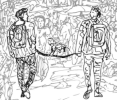 |
On World Tour  |
En Tour du Monde  |
In Tour Mondiale  |
En Gira Mundial  |
(Deutsch) Dies ist die linguistische Version der zweiten Staffel der Jungs. Die Texte sind dieselben wie auf der Hauptseite. |
(English) This is the linguistic version of the second season of the Boys. The texts are the same as on the main page. |
(Français) Voici la version linguistique de la deuxième saison des Gars. Les textes sont les mêmes que sur la page principale. |
(Italiano) Questa è la versione linguistica della seconda stagione dei Ragazzi. I testi sono gli stessi della pagina principale. |
(Español) Esta es la versión lingüística de la segunda temporada de los Chicos. Los textos son los mismos que en la página principal. |
(English) Surprise: Heinz is given a trip around the world as a present at the start of his vacation. This is because Helmut has made a bet with his girlfriend Hedu that he can travel around the world in 80 days like Phileas Fogg in Jules Verne's book. The travel fund is well stocked and Helmut assures his friend that he will take full responsibility for everything. |
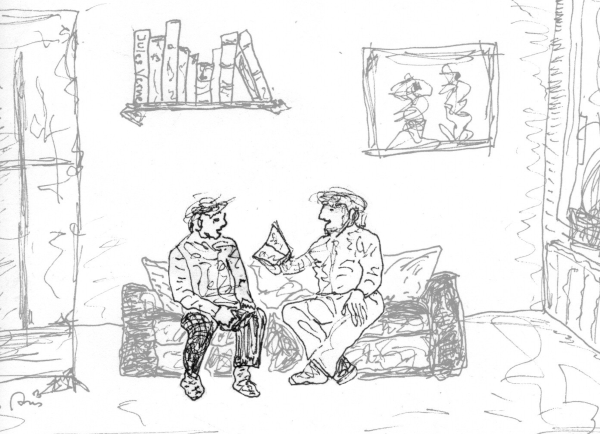 |
(Italiano) Sorpresa: Heinz riceve il regalo di un viaggio intorno al mondo all'inizio della sua vacanza. Helmut infatti ha scommesso con la sua ragazza Hedu di riuscire a fare il giro del mondo in 80 giorni come Phileas Fogg nel libro di Jules Verne. Il fondo viaggi è ben riempito e Helmut promette all'amico che si assumerà la piena responsabilità di tutto. |
(Deutsch) Überraschung: Heinz bekommt zum Urlaubsbeginn eine Weltreise geschenkt. Helmut hat nämlich mit seiner Freundin Hedu gewettet, wie Phileas Fogg im Buch von Jules Verne in 80 Tagen um die Welt reisen zu können. Die Reisekasse ist gut gefüllt und Helmut versichert seinem Freund, dass er die volle Verantwortung für alles übernimmt. Normal Version | ||
Tag 0 1 Helmut: Alles Gute zum Urlaubsbeginn! |
Day 0 Helmut: Happy start of your vacation! |
Jour 0 Helmut : Joyeux début de vacances ! |
Giorno 0 Helmut: Buon inizio di vacanza! |
Día 0 Helmut: ¡Feliz comienzo de tus vacaciones! |
2 Helmut: Jules Verne, Wette mit Hedu, hier Buch, lies selbst! |
Helmut: Jules Verne, bet with Hedu, here book, read yourself! |
Helmut : Jules Verne, pari avec Hédou, voici livre, lis toi-même ! |
Helmut: Jules Verne, scommessa con Hedu, ecco libro, leggi tu! |
Helmut: ¡Julio Verne, apuesta con Hedu, aquí libro, ¡léelo tú mismo! |
3 Helmut: Ach ja. Also ich so zu ihr: OK, für die Summe der Wette im Buch mach ich es diesem Phileas nach. |
Helmut: Oh yeah. So I told her: OK, for the amount of the bet in the book, I'll do the same as this Phileas guy. |
Helmut : Ah oui. Alors je lui dis : OK, pour le montant du pari dans le roman, je fais comme ce Philéas. |
Helmut: Oh sì. Così le dissi: Ok, per l'importo della scommessa del libro, farò come quel Phileas lì. |
Helmut: Ah, sí. Así que le dije: Vale, por el importe de la apuesta en el libro, haré lo que hizo Philéas. |
4 Heinz: Wieso London? Hey, der Zug fährt ja schon in drei Stunden ab! |
Heinz: Why London? Hey, the train leaves in three hours! |
Heinz : Pourquoi Londres ? Hé, le train part déjà dans trois heures ! |
Heinz: Perché Londra? Ehi, il treno parte tra tre ore! |
Heinz: ¿Por qué Londres? ¡Eh! El tren sale dentro de tres horas. |
5 Heinz: Wusste Hedu das? |
Heinz: Did Hedu know that? |
Heinz : Hédou le savait-il ? |
Heinz: Hedu lo sapeva? |
Heinz: ¿Lo sabía Hedu? |
6 Heinz: Und wer zahlt den Spaß? Der Verlierer? |
Heinz: And who pays for the fun? The loser? |
Heinz : Et qui paie le plaisir ? Le perdant ? |
Heinz: E chi paga per il viaggio? Chi perde? |
Heinz: ¿Y quién paga el placer? ¿El perdedor? |
7 Helmut: Also nur das Übliche. Keine Sorge, Hedu wird über uns wachen und denk an meine Kontakte zu den Streitkräften. Das könnte mal nützlich werden. |
Helmut: So just the usual. Worry not, Hedu will watch over us, and remember my contacts in the armed forces. That could come in handy some day. |
Helmut : Donc juste la routine. Ne t'inquiète pas, Hédou veillera sur nous et pense à mes contacts dans les forces armées. Cela pourrait être utile un jour. |
Helmut: Quindi il solito. Non preoccuparti, Hedu veglierà su di noi e anche ricorda i miei contatti nelle forze armate. Potrebbero tornare utili. |
Helmut: Pues lo de siempre. No te preocupes, Hedu velará por nosotros y también recuerda mis contactos en las fuerzas armadas. Eso podría ser útil algún día. |
8 Heinz: Aber die Koffer. |
Heinz: But the suitcases? |
Heinz : Mais les valises. |
Heinz: Ma le valigie. |
Heinz: Pero las maletas. |
(English) In London the journey begins. Heinz and Helmut take a selfie in front of the legendary Reform Club and reminisce about the day 150 years ago when Phileas Fogg made the historic bet with other club members. After a short meditation, they ride to the station past Trafalgar Square to catch the train to Paris. |
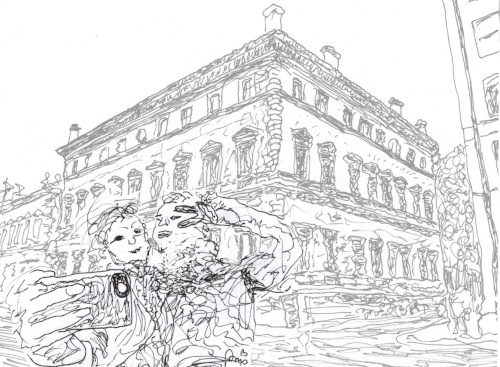 |
(Italiano) Il viaggio inizia a Londra. Heinz e Helmut si scattano un selfie davanti al leggendario Reform Club e ricordano il giorno in cui, 150 anni fa, Phileas Fogg fece la storica scommessa con altri membri del club. Dopo una breve meditazione, passano davanti a Trafalgar Square e raggiungono la stazione ferroviaria per prendere il treno di Parigi. |
(Deutsch) In London beginnt die Reise. Heinz und Helmut machen ein Selfie vor dem legendären Reformclub und vergegenwärtigen sich den Tag vor 150 Jahren, an dem Phileas Fogg an diesem Ort mit anderen Clubmitgliedern die historische Wette einging. Nach einer kurzen Andacht geht es am Trafalgar Square vorbei zum Bahnhof, um den Zug nach Paris zu erreichen. Normal Version | ||
Tag 1 1 Heinz: Ist es das Eckhaus da? Die Straße stimmt: Pall Mall. |
Club Day 1 Heinz: Is it the corner house there? The street is correct: Pall Mall. |
Jour 1 Heinz : C'est la maison du coin, là ? La rue correspond : Pall Mall. |
Giorno 1 Heinz: È la casa all'angolo? La strada è quella giusta: Pall Mall. |
Día 1 Heinz: ¿Es la casa de la esquina? La calle está bien: Pall Mall. |
2 Heinz: Können wir da vielleicht mal reingehen? |
Heinz: Do you think we could go inside? |
Heinz : On peut y entrer, peut-être ? |
Heinz: Possiamo entrare? |
Heinz: ¿Crees que podríamos entrar? |
3 Heinz: Kontrastiert schön mit dem Mampf aus der Burgerbude, den wir uns vorhin reingezogen haben. |
Heinz: Contrasts nicely with the munch from the burger joint we grabbed earlier. |
Heinz : Contraste joliment avec la tambouille de fast-food que nous venons d'avaler. |
Heinz: Fa un bel contrasto con la roba da fast food che ci siamo pappati poco fa. |
Heinz: Contrasta muy bien con la bazofia de la hamburguesería que acabamos de tragar. |
4 Heinz: Muss anstrengend sein. |
Heinz: Must be exhausting. |
Heinz : Ça doit être épuisant. |
Heinz: Deve essere estenuante. |
Heinz: Debe de ser agotador. |
5 Heinz: Also haben wir wegen eines Selfies knapp tausend Kilometer verheizt. |
Heinz: So we burned almost a thousand kilometers because of a selfie. |
Heinz : Donc, nous avons brûlé près de mille kilomètres pour un selfie. |
Heinz: Così abbiamo bruciato quasi mille chilometri per un selfie. |
Heinz: Así que hemos quemado casi mil kilómetros por un selfie. |
6 Heinz: Und was hast du dieses Mal für Paris vorgesehen, wenn wir offiziell da sind? Montmartre, Eiffelturm, Jardin des Tuileries? |
Heinz: And what have you planned for Paris this time, when we are officially there? Montmartre, Eiffel Tower, Jardin des Tuileries? |
Heinz : Et qu'as-tu prévu pour Paris cette fois-ci, quand nous y serons officiellement ? Montmartre, Tour Eiffel, Jardin des Tuileries ? |
Heinz: E cosa hai in programma per Parigi questa volta, quando saremo ufficialmente lì? Montmartre, Torre Eiffel, Jardin des Tuileries? |
Heinz: ¿Y qué tienes planeado para París esta vez, cuando estemos oficialmente allí? ¿Montmartre, la Torre Eiffel, el Jardín de las Tullerías? |
7 Helmut: Nö. Da ist nur 'ne Liste mit Ankunfts- und Abfahrtszeiten in Kapitel 7. Und da steht, dass es 6,5 Tage bis Suez sind, am neunten Oktober. |
Helmut: Nope. There's just a list of arrival and departure times in chapter 7. And it says that it's 6.5 days to Suez, on the ninth of October. |
Helmut : Non. Il y a juste une liste d'heures d'arrivée et de départ au chapitre 7. Et il est écrit que c'est 6,5 jours jusqu'à Suez, le 9 octobre. |
Helmut: No. C'è solo una lista di orari di arrivo e partenza nel capitolo 7. E dice che ci sono 6,5 giorni per Suez, il 9 ottobre. |
Helmut: No. Solo hay una lista de horas de llegada y salida en el capítulo 7, y dice que son 6,5 días hasta Suez, el nueve de octubre. |
(English) A wonderful day in Paris! Well, almost wonderful, because Helmut has a little mishap on the roof terrace of the hotel. Heinz wants to take care of it, but runs into problems of his own. Fortunately, there are plenty of helping hands around them. |
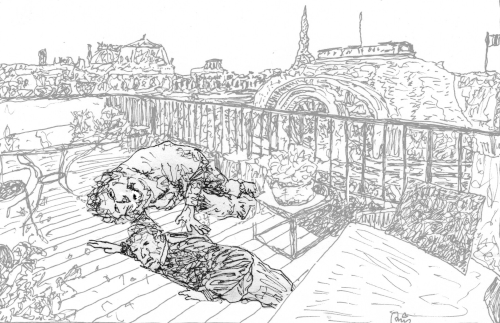 |
(Italiano) Una giornata meravigliosa a Parigi! Beh, quasi meravigliosa, perché Helmut incontra un piccolo inconveniente sulla terrazza dell'hotel. Heinz vuole occuparsene, ma si trova in difficoltà per conto suo. Fortunatamente, ci sono molte mani che aiutano. |
(Deutsch) Ein wunderbarer Tag in Paris! Na ja, fast wunderbar, denn Helmut geschieht ein kleines Malheur auf der Dachterrasse des Hotels. Heinz will sich darum kümmern, bekommt aber eigene Probleme. Zum Glück sind genügend helfende Hände da. Normal Version | ||
Du Palais Royal Tag 2 1 Helmut: Über den Dächern von Paris! Jahaaaaa! Wow, ey, oh! Aaargh!!! |
Du Palais Royal Day 2 Helmut: Above the rooftops of Paris! Yahaaaaa! Wow, ey, oh! Aaargh!!! |
Du Palais Royal Jour 2 Helmut : Sur les toits de Paris ! Yuppiiieeee ! Wow, ey, oh ! Aaargh !!! |
Du Palais Royal Giorno 2 Helmut: Sopra i tetti di Parigi! Gahaaaaa! Wow, ey, oh! Aaargh!!! |
Du Palais Royal Día 2 Helmut: ¡Sobre los tejados de París! ¡Yahaaaaa! Wow, ey, ¡oh! ¡¡¡Aaargh!!! |
2 Helmut: Ich hab aus Versehen das Tablett mit den Sektflöten erwischt und bin mit der Hand abgerutscht. |
Helmut: I accidentally hit the tray with the champagne flutes and slipped with my hand. |
Helmut : J'ai accidentellement attrapé le plateau avec les flûtes à champagne et j'ai glissé la main. |
Helmut: Ho urtato per sbaglio il vassoio con i flute di champagne e sono scivolato con la mano. |
Helmut: He golpeado sin querer la bandeja con las copas de champán y me he resbalado con la mano. |
3 Heinz: Oh Mann, du liegst in einer Sektlache. |
Heinz: Oh man, you're lying in a pool of champagne. |
Heinz : Oh là là, tu es couché dans une flaque de champagne. |
Heinz: Oh cavolo, sei sdraiato in una pozza di champagne. |
Heinz: Tío, estás tirado en un charco de champán. |
4 Heinz: Wir hatten Zeit für den Montmartre. Das rechne ich dir hoch an, auch wenn's ziemlich bergig war. Und dann der laute Typ in der Jogginghose, der sich fast auf dir übergeben hätte. |
Heinz: We had time for Montmartre. I give you credit for that, even though it was pretty hilly. And then the loud guy in the sweatpants, who almost threw up on you. |
Heinz : Nous avons eu le temps de visiter Montmartre. Je t'en donne tout le crédit, même si c'était assez montagneux. Et puis le gars bruyant en jogging qui a failli vomir sur toi. |
Heinz: Abbiamo avuto tempo per Montmartre. Te ne do atto, anche se era piuttosto collinoso. E poi il tizio rumoroso con i pantaloni della tuta che per poco non ti vomitava addosso. |
Heinz: Tuvimos tiempo para Montmartre. Te doy crédito por ello, aunque fuera bastante montañoso. Y luego el tipo ruidoso del chándal que casi te vomita encima. |
5 Helmut: Ich hab das schon kurz hinter Mainz online beantragt. Express fünf Tage, kommt per Email. |
Helmut: I already applied for it online shortly after Mainz. Express five days, comes by email. |
Helmut : J'ai déjà fait la demande en ligne juste après Mayence. Express cinq jours, arrive par email. |
Helmut: L'ho richiesto online poco dopo aver lasciato Magonza. Espresso in cinque giorni, arriva per e-mail. |
Helmut: Ya lo solicité por Internet poco después de salir de Maguncia. Exprés en cinco días, llega por correo electrónico. |
6 Helmut: Benutzen die hier noch „Frollein”? |
Helmut: Do they still use "Frollein" here? |
Helmut : Ils utilisent encore « Frollein » ici ? |
Helmut: Qui usano ancora "signorina"? |
Helmut: ¿Aquí todavía usan "Frollein"? |
7 Heinz: Und jetzt ausschlafen. Bin ich gerädert! Müssen wir früh raus? |
Heinz: And now a good night's sleep. I'm so exhausted! Do we have to get up early? |
Heinz : Et maintenant, on va faire la grasse matinée. Je suis crevé ! On doit se lever tôt ? |
Heinz: E ora dormire fino a tardi. Come sono esausto! Dobbiamo alzarci presto? |
Heinz: Y ahora a dormir bien. ¡Estoy agotado! ¿Tenemos que madrugar? |
8 Heinz: Au weia! |
Heinz: Oh dear! |
Heinz : Aïe aïe aïe ! |
Heinz: Oh, cielo! |
Heinz: ¡Oh cielos! |
(English) Italy, land of culture, beautiful landscapes and culinary delights! The boys spend a turbulent day in Turin, each in his own way. As it turns out, Helmut has less difficulty adapting to the local conditions than Heinz. |
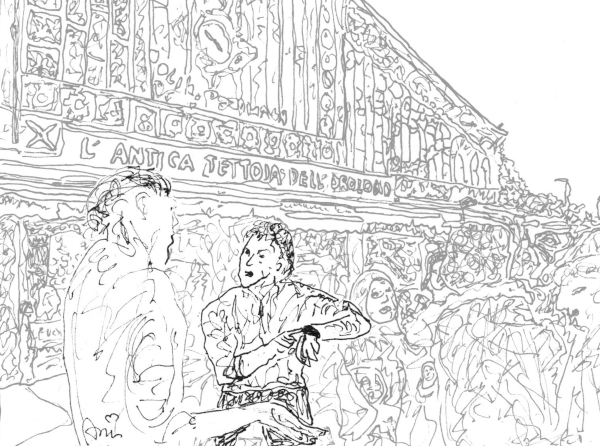 |
(Italiano) Italia, terra di cultura, splendidi paesaggi e delizie culinarie! I ragazzi trascorrono una giornata movimentata a Torino, ciascuno a modo suo. Si scopre che Helmut ha meno difficoltà ad adattarsi alle condizioni locali rispetto a Heinz. |
(Deutsch) Italien, Land der Kultur, der schönen Landschaften und der kulinarischen Genüsse! Die Jungs verbringen einen turbulenten Tag in Turin, jeder auf seine Weise. Wie sich herausstellt, hat Helmut weniger Schwierigkeiten damit, sich an die dortigen Gegebenheiten anzupassen, als Heinz. Normal Version | ||
in Turin Tag 4 1 Helmut: Ey, wo bleibst du! Wir wollten uns um drei hier am alten Uhrendach treffen, jetzt ist es fast fünf! Dein Handy war auch aus. |
in Turin Day 4 Helmut: Hey, where have you been? We were supposed to meet here at the old clock roof at three, now it's almost five. Your cell phone was off, too. |
à Turin Jour 4 Helmut : Hé, où tu es passé ! Nous devions nous retrouver ici, au vieux auvent de l'horloge, à trois heures, et maintenant il est presque cinq ! Ton téléphone était éteint aussi. |
a Torino Giorno 4 Helmut: Ehi, dove sei? Dovevamo incontrarci qui all'antica tettoia dell'orologio alle tre, ora sono quasi le cinque! Anche il tuo cellulare era disattivato. |
Día 4 Helmut: Oye, ¿dónde estás? Habíamos quedado aquí en el tejado del viejo reloj a las tres, ahora son casi las cinco. Tu móvil también estaba apagado. |
2 Helmut: Komm mit, lass uns den überdachten Markt ankucken gehen. Hier rein! Erzähl weiter! |
Helmut: Come on, let's go check out the covered market. In here! Continue! |
Helmut : Viens, allons voir le marché couvert. Là dedans ! Vas-y, continue ! |
Helmut: Dai, andiamo a dare un'occhiata al mercato coperto. Qui dentro! Forza! Continua! |
Helmut: Venga, vamos a ver el mercado cubierto. ¡Ahí dentro! ¡Sigue hablando! |
3 Helmut: Du kannst immer noch einen draufsetzen, das ist doch schon was. |
Helmut: You always manage to push it even further, that's something. |
Helmut : Tu peux toujours en rajouter une couche, c'est déjà pas mal. |
Helmut: Puoi sempre rincarare la dose, è già qualcosa. |
Helmut: Siempre puedes volver a cargar las tintas, algo es algo. |
4 Helmut: Was die Ananas-Pizza betrifft ... |
Helmut: As for the pineapple pizza... |
Helmut : En ce qui concerne la pizza à l'ananas... |
Helmut: Per quanto riguarda la pizza all'ananas... |
Helmut: En cuanto a la pizza de piña... |
5 Heinz: Die haben überaus grimmige Gesichter gehabt. Sehr unsympathisch. |
Heinz: They had extremely grim faces. Very unsympathetic. |
Heinz : Ils avaient des visages extrêmement grimaçants. Pas très sympathiques. |
Heinz: Avevano facce sommamente truci. Molto antipatici. |
Heinz: Tenían caras sumamente sombrías. Muy antipáticos. |
6 Helmut: Hm. Warte mal kurz. Ich bin gleich wieder da. (...) Hier, das heißt Sfogliatelle. Gebäck mit sahniger Füllung. Das wird dich aufmuntern. |
Helmut: Hm. Hold on a minute. I'll be right back. (...) Here, it's called sfogliatelle. Pastries with creamy filling. That will cheer you up. |
Helmut : Hum. Attends une seconde. Je reviens tout de suite. (...) Tiens, ça s'appelle des sfogliatelle. Des pâtisseries avec un fourrage crémeux. Ça va te remonter le moral. |
Helmut: Hm. Aspetta un attimo. Torno subito. (...) Ecco, si chiamano sfogliatelle. Pasticcini con ripieno cremoso. Ti tirerà su il morale. |
Helmut: Hm. Espera un momento. Enseguida vuelvo. (...) Aquí, se llama sfogliatelle. Dulces con un relleno cremoso. Eso te animará. |
7 Heinz: Weil das ungewöhnlich ist. Vor acht Wochen konntest du noch überhaupt kein Italienisch. |
Heinz: Because it's unusual. Eight weeks ago you didn't know any Italian at all. |
Heinz : Parce que c'est extraordinaire. Il y a huit semaines, tu parlais pas un mot d'italien. |
Heinz: Perché è insolito. Otto settimane fa non conoscevi affatto l'italiano. |
Heinz: Porque es inusual. Hace ocho semanas no hablabas ni una palabra de italiano. |
8 Heinz: Scusi. Ich sollte einfach die Fresse halten, nach allem, was ich heute schon verbockt hab. |
Heinz: Scusi. I should better keep my mouth shut, after everything I already screwed up today. |
Heinz : Scusi. Je devrais simplement fermer ma gueule, après tout ce que j'ai déjà gâché aujourd'hui. |
Heinz: Scusi. Dovrei chiudere la bocca, dopo tutto quello che ho già combinato oggi. |
Heinz: Scusi. Será mejor que mantenga la boca cerrada, después de todo lo que he arruinado hoy. |
9 Helmut: Ich hab keine Ahnung, worauf du hinauswillst, aber die haben mir ein paar gemütliche Musikschuppen mit kulinarischen Delikatessen empfohlen, und wenn wir es vor Sonnenuntergang schaffen, sollten wir die Panoramaaussicht oben im Filmmuseum nicht verpassen. |
Helmut: I have no idea what you're getting at, but they recommended a couple of cozy music venues with culinary delicacies, and if we make it before sunset, we shouldn't miss the panoramic view at the top of the Film Museum. |
Helmut : Je n'ai aucune idée de ce à quoi tu fais allusion, mais ils m'ont conseillé quelques endroits confortables pour écouter de la musique avec des délices culinaires, et si nous arrivons avant le coucher du soleil, nous ne devrions pas manquer la vue panoramique en haut du musée du film. |
Helmut: Non ho idea di cosa tu voglia dire, ma ci hanno consigliato un paio di accoglienti locali di musica con specialità culinarie e, se arriviamo prima del tramonto, non dovremmo perderci la vista panoramica in cima al museo del cinema. |
Helmut: No tengo ni idea de a dónde quieres llegar, pero me recomendaron un par de locales de música acogedores con delicias culinarias, y si llegamos antes de la puesta de sol, no deberíamos perdernos la vista panorámica en lo alto del museo del cine. |
(English) When they arrive in Brindisi, they are faced with a problem: there have been no passenger ships leaving for Egypt from here for a long time. Nevertheless, Helmut finds a way. He negotiates with a yacht owner and surprises Heinz with his skills. |
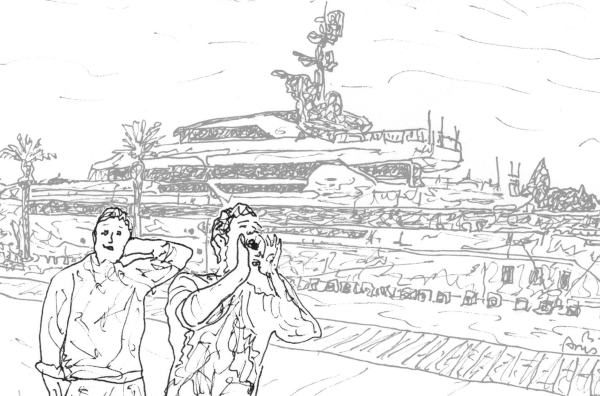 |
(Italiano) Quando arrivano a Brindisi, i due si trovano di fronte a un problema: da molto tempo non ci sono navi passeggeri in viaggio da qui all'Egitto. Tuttavia, Helmut trova un modo. Negozia con il proprietario di uno yacht e sorprende Heinz con le sue abilità. |
(Deutsch) In Brindisi angekommen stehen die beiden vor einem Problem: Es fahren schon lange keine Passagierschiffe mehr von hier nach Ägypten. Helmut findet trotzdem einen Weg. Er verhandelt mit einem Jachtbesitzer und überrascht Heinz mit seinen Fähigkeiten. Normal Version | ||
Tag 6 1 Helmut: Erst hab ich gedacht, unsere Aufgabe ist zu einfach, aber jetzt wird's doch etwas knifflig. |
Day 6 Helmut: First I thought our task was too easy, but now it's getting a bit tricky. |
Jour 6 Helmut : Au début, je pensais que notre tâche était trop simple, mais maintenant, ça devient un peu délicat. |
Giorno 6 Helmut: Prima pensavo che il nostro compito fosse troppo facile, ma ora sta diventando un po' complicato. |
Día 6 Helmut: Al principio pensé que nuestra tarea era demasiado fácil, pero ahora se está complicando un poco. |
2 Helmut: Sorry, was? Ja, 150 Jahre. Damals war der Mont-Cenis-Tunnel brandneu, heute ist er eine Art Museum. Deshalb konnten wir direkt nach Turin fahren. Hat irre Zeit gespart. |
Helmut: Sorry, what? Yes, 150 years. Back then, the Mont Cenis Tunnel was brand new, today it's a kind of museum. That's why we could go straight to Turin. Saved a lot of time. |
Helmut : Désolé, quoi ? Oui, 150 ans. A l'époque, le tunnel du Mont-Cenis était tout neuf, aujourd'hui c'est une sorte de musée. C'est pourquoi on a pu aller directement jusqu'à Turin. Ça nous a fait gagner un temps fou. |
Helmut: Scusa, cosa? Sì, 150 anni. All'epoca il tunnel del Mont Cenis era appena costruito, oggi è una specie di museo. Ecco perché potevamo andare direttamente a Torino. Abbiamo risparmiato un sacco di tempo. |
Helmut: Perdón, ¿qué? Sí, hace 150 años. Entonces, el túnel de Mont Cenis era nuevo, hoy es una especie de museo. Por eso pudimos ir directamente a Turín. Ahorramos mucho tiempo. |
3 Helmut: Wir könnten über Griechenland ausweichen, da gibt es Fähren, aber das will ich nicht. Ich will jetzt nach Suez und basta! |
Helmut: We could go via Greece, there are ferries there, but I don't want to do that. I want to go to Suez and basta! |
Helmut : Nous pourrions passer par la Grèce, il y a des ferries là-bas, mais je ne veux pas. Je veux aller à Suez, basta ! |
Helmut: Potremmo passare per la Grecia, ci sono traghetti, ma non voglio farlo. Voglio andare a Suez e basta! |
Helmut: Podríamos pasar por Grecia, allí hay ferries, pero no quiero hacer eso. Quiero ir a Suez y ¡basta! |
4 Heinz: Öfter wird auch der Komparativ benötigt oder ein selteneres Wort. |
Heinz: Occasionally the use of the comparative is needed, or a rarer word. |
Heinz : De temps en temps, l'utilisation du comparatif est nécessaire, ou d'un mot plus rare. |
Heinz: Occasionalmente è necessario l'uso del comparativo o di una parola più rara. |
Heinz: De vez en cuando es necesario utilizar el comparativo, o una palabra más rara. |
5 Helmut: Quatsch nicht! Doch, tatsächlich. Ha, das Schiff im Buch heißt Mongolia. |
Helmut: Don't be silly! Oh yes, it really is. Ha, the ship in the book is called Mongolia. |
Helmut : Sois pas bête ! Oh oui, c'est vraiment ça. Ha, le bateau dans le livre s'appelle Mongolia. |
Helmut: Smettila! Oh sì, lo è davvero. Ah, la nave del libro si chiama Mongolia. |
Helmut: ¡No digas tonterías! Oh sí, realmente lo es. Ja, el barco del libro se llama Mongolia. |
6 Heinz: Jau. (...) Jetzt ruf ich ihn an, es wird schon dunkel. Blöder Mist. Was ist das denn, ein Taxi? |
Heinz: Yes. (...) Now I'll call him, it's already getting dark. This sucks. Hey, what's that, a cab? |
Heinz : Oui. (...) Maintenant, je vais l'appeler, la nuit tombe déjà. Ça craint. Hé, c'est quoi ça, un taxi ? |
Heinz: Sì. (...) Ora lo chiamo, sta già facendo buio. Che seccatura. Ehi, cos'è quello, un taxi? |
Heinz: Sí. (...) Ahora le llamo, que ya está anocheciendo. Qué rollo. Eh, ¿qué es eso, un taxi? |
7 Heinz: Weil ... |
Heinz: Because... |
Heinz : Parce que... |
Heinz: Perché... |
Heinz: Porque... |
8 Heinz: Hm, hm, hm. |
Heinz: Hm, hm, hm. |
Heinz : Hm, hm, hm. |
Heinz: Hm, hm, hm. |
Heinz: Hm, hm, hm. |
(English) All the things you have to think about! The crossing to Africa on the luxury yacht doesn't quite go to plan. But Helmut sees himself on a mission and can't be brought down. He's also taken a few gimmicks with him... |
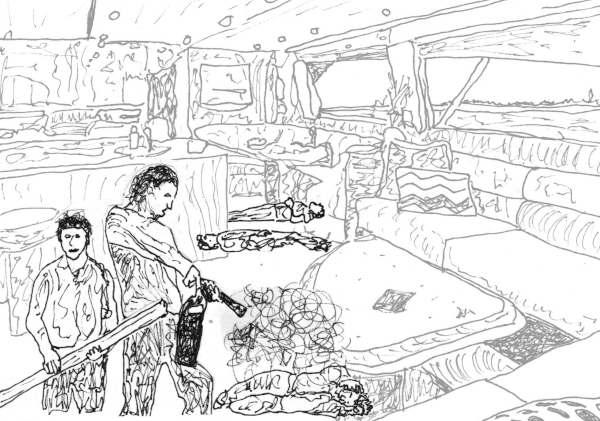 |
(Italiano) Tutte le cose a cui devi pensare! La traversata verso l'Africa a bordo di uno yacht di lusso non va come previsto. Ma Helmut si considera in missione e non si lascia abbattere. Ha anche portato con sé alcuni gadget... |
(Deutsch) An was man nicht alles denken muss! Die Überfahrt auf der Luxusjacht nach Afrika verläuft nicht ganz nach Plan. Helmut aber sieht sich auf einer Mission und ist nicht unterzukriegen. Außerdem hat er ein paar Gimmicks mitgenommen ... Normal Version | ||
Tag 7 1 Heinz: Das war mein Fuß. |
Day 7 Heinz: That was my foot. |
Jour 7 Heinz : C'était mon pied. |
Giorno 7 Heinz: Era il mio piede. |
Día 7 Heinz: Era mi pie. |
2 Helmut: Wir sind auf einer Mission. |
Helmut: We're on a mission. |
Helmut : Nous sommes en mission. |
Helmut: Siamo in missione. |
Helmut: Tenemos una misión. |
3 Helmut: 30 für Sepp und 10 für die Weiterreise. Mit dieser VIP-Karte krieg ich überall im Handkuss-Umdrehen so viel Bares, wie ich will. |
Helmut: 30 for Zepp and 10 for the way on. With this premium card I can get as much cash as I want anywhere in the twinkling of no time. |
Helmut : 30 pour Zepp et 10 pour la continuation. Avec cette carte VIP, je peux obtenir autant d'argent que je veux n'importe où en un claque de temps. |
Helmut: 30 per Zepp e 10 per il viaggio. Con questa carta VIP posso ottenere tutti i contanti che voglio ovunque in quattro e quattr'otto battiti di ciglia. |
Helmut: 30 para Zepp y 10 para el viaje de ida. Con esta tarjeta VIP, puedo conseguir todo el dinero que quiera en cualquier lugar en un abrir y cerrar de brazos abiertos. |
4 Helmut: Komm schnell, solange sie abgelenkt sind. |
Helmut: Come quickly, as long as they're distracted. |
Helmut : Viens vite, tant qu'ils sont distraits. |
Helmut: Vieni subito, finché sono distratti. |
Helmut: Ven rápido, mientras estén distraídos. |
5 Helmut: Pock den hier noch mal! |
Helmut: Pock this one again! |
Helmut : Poc celui-là encore une fois ! |
Helmut: Fai un altro poc qui! |
Helmut: ¡Poclo otra vez! |
6 Helmut: Was meinst du? Ey pass auf, da sind überall Reste. |
Helmut: What do you mean? Hey watch out, there are residues all over the place. |
Helmut : Qu'est-ce que tu veux dire ? Hé attention, il y a des résidus partout. |
Helmut: Cosa vuoi dire? Ehi, attenzione, ci sono residui dappertutto. |
Helmut: ¿Qué quieres decir? Eh, cuidado, hay residuos por todas partes. |
7 Helmut: Das hätte ich echt nicht gedacht von Sepp. Schien ein netter Kerl zu sein. |
Helmut: I really didn't expect that from Zepp. Seemed like a nice guy. |
Helmut : Je n'aurais jamais cru ça de Zepp. Il avait l'air d'être un bon gars. |
Helmut: Non mi aspettavo proprio questo da Zepp. Sembrava un bravo ragazzo. |
Helmut: Nunca habría esperado eso de Zepp. Parecía un buen tipo. |
(English) While they drink tea and smoke a hookah, Helmut learns about Heinz' strange encounter in the pharmacy. At first he thinks it's a joke, but in the end they both feel a little queasy. |
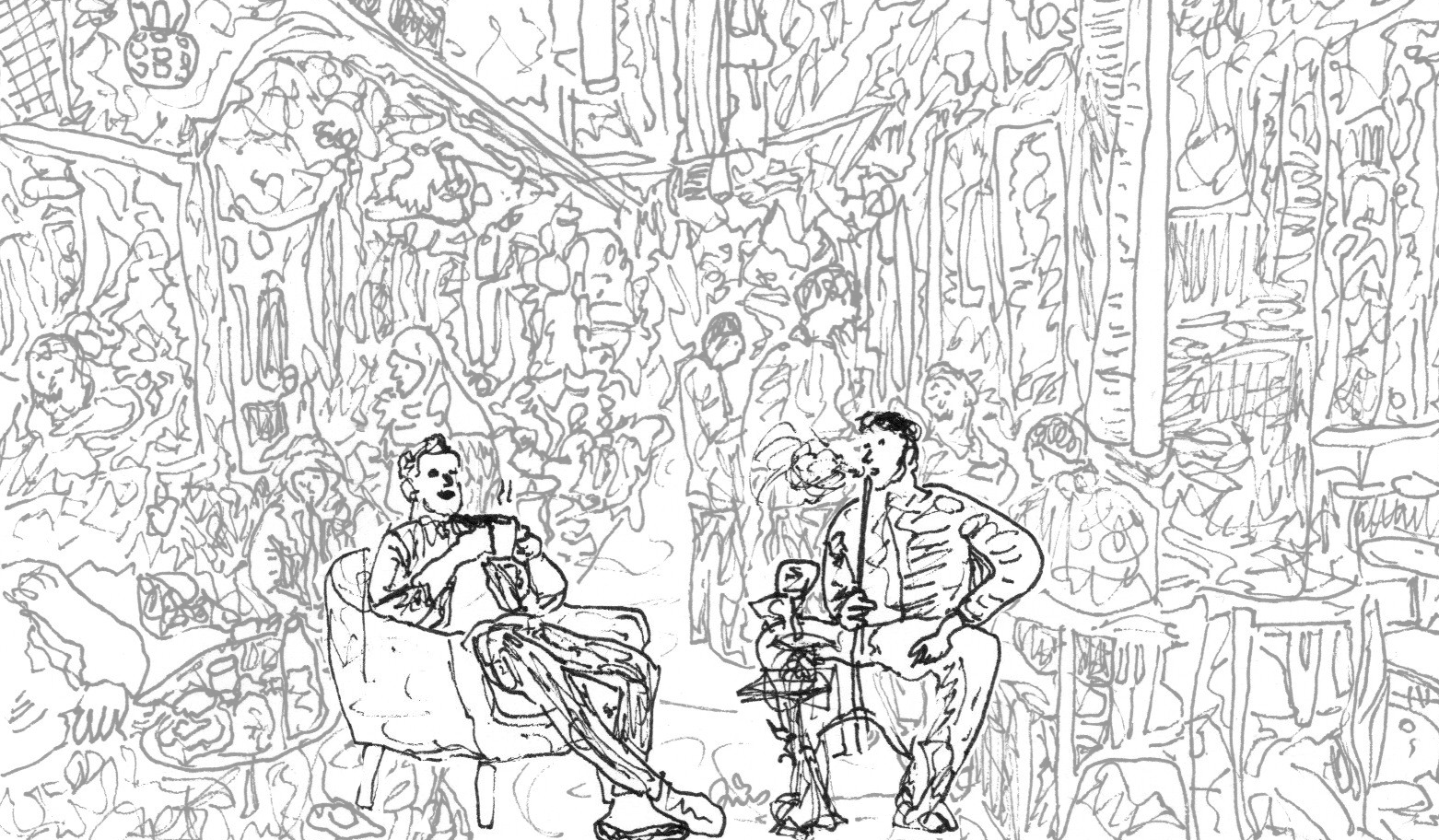 |
(Italiano) Mentre bevono tè e fumano un narghilè, Helmut viene a sapere dello strano incontro di Heinz in farmacia. All'inizio pensa che si tratti di uno scherzo, ma alla fine entrambi provano un po' di disagio. |
(Deutsch) Während sie Tee trinken und eine Wasserpfeife rauchen, erfährt Helmut von Heinz' absonderlicher Begegnung in der Apotheke. Erst glaubt er, es sei ein Spaß, doch am Ende wird beiden ein wenig mulmig. Normal Version | ||
Tag 9 1 Heinz: Und wo genau? |
Day 9 Heinz: And where exactly? |
Jour 9 Heinz : Et où exactement ? |
Giorno 9 Heinz: E dove esattamente? |
Día 9 Heinz: ¿Y dónde exactamente? |
2 Helmut: Hast du alles gekriegt? |
Helmut: Did you get everything? |
Helmut : Tu as tout obtenu ? |
Helmut: Hai preso tutto? |
Helmut: ¿Lo tienes todo? |
3 Helmut: Du hast ihr von dem Geld erzählt? |
Helmut: You told her about the money? |
Helmut : Tu lui as parlé de l'argent ? |
Helmut: Le hai detto dei soldi? |
Helmut: ¿Le hablaste del dinero? |
4 Heinz: Ich weiß. Bis Mumbai ist dein Knöchel bestimmt wieder gut. Ist nur angeschwollen. Hier, ich hab dir deine Salbe mitgebracht und Rheumapflaster, vielleicht helfen die. Und die Krücke. |
Heinz: I know. I'm sure your ankle will be fine by Mumbai. It's just swollen. Here, I brought you your ointment and some pain relief patches, maybe they help. And the crutch. |
Heinz : Je sais. Je suis sûr que ta cheville ira mieux à Mumbai. Elle est juste enflée. Tiens, je t'ai apporté ta pommade et des patchs antidouleur, ça t'aidera peut-être. Et la béquille. |
Heinz: Lo so. Sono sicuro che la tua caviglia sarà a posto per Mumbai. È solo gonfia. Ecco, ti ho portato la tua pomata e dei cerotti antidolorifici, magari ti aiutano. E la stampella. |
Heinz: Lo sé. Seguro que tu tobillo estará bien hasta Bombay. Solo está hinchado. Toma, te he traído la pomada y algunas parches analgésicos, quizá te ayuden. Y la muleta. |
5 Helmut: Das sind deine Haken? Befreundete Beamte und ein Traumschiff? |
Helmut: These are your snags? Friendly officials and a dream ship? |
Helmut : Voilà tes hic ? Des agents amis et un bateau de rêve ? |
Helmut: Sono questi i tuoi intoppi? Funzionari amici e una nave da sogno? |
Helmut: ¿Esos son tus inconvenientes? ¿Funcionarios amistosos y una nave de ensueño? |
6 Heinz: Ich werd's noch mal nachlesen. Ich wusste nur noch das mit der Frau. Aouda. Ehrlich. |
Heinz: I'll have to read it again. I only remember that about the woman. Aouda. Honestly. |
Heinz : Je vais le relire. Je ne me souvenais que de l'histoire de la femme. Aouda. Sincèrement. |
Heinz: Lo rileggerò. Mi sono ricordato solo della donna. Aouda. Onestamente. |
Heinz: Volveré a leerlo. Solo me acordaba de la mujer. Aouda. Sinceramente. |
7 Heinz: Du hattest gesagt, dass Franklin wegen irgendwelcher Vorwürfe zurück bei seiner Einheit in Virginia ist. |
Heinz: You said that Franklin is back with his unit in Virginia because of some accusations. |
Heinz : Tu as dit que Franklin est retourné à son unité en Virginie à cause de certaines accusations. |
Heinz: Hai detto che Franklin è tornato alla sua unità in Virginia a causa di alcune accuse. |
Heinz: Has dicho que Franklin ha vuelto con su unidad en Virginia debido a unas acusaciones. |
(English) The next day, the boys board a ship to Mumbai. But can it be called a ship? Everything is so big on the Megalomania! They have to take a bus to get to their cabins. Once there, they seek clarification. |
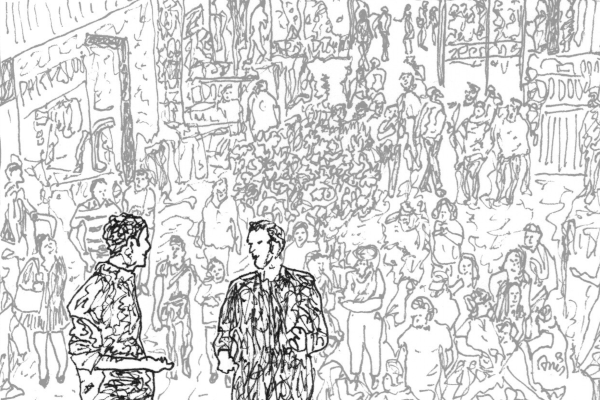 |
(Italiano) Il giorno dopo, i ragazzi si imbarcano su una nave per Mumbai. Ma si può chiamare nave? Tutto è così grande sulla Megalomania! Devono prendere un autobus per raggiungere le loro cabine. Una volta arrivati, chiedono chiarimenti. |
(Deutsch) Am nächsten Tag besteigen die Jungs ein Schiff nach Mumbai. Aber kann man das ein Schiff nennen? Alles ist so groß auf der Megalomania! Sie müssen einen Bus nehmen, um zu ihren Kabinen zu gelangen. Dort angekommen, suchen sie Klärung. Normal Version | ||
Tag 10 1 Heinz: Ey, es gibt hier eine Eisenbahnlinie, ich glaub das nicht. |
Day 10 Heinz: Hey, there's a railroad line here, I don't believe it. |
Jour 10 Heinz : Eh ben, il y a une ligne de chemin de fer ici, je n'y crois pas. |
Giorno 10 Heinz: Ehi, c'è una linea ferroviaria qui, non ci credo. |
Día 10 Heinz: Oye, aquí hay una línea de ferrocarril, no me lo puedo creer. |
2 Helmut: Da hinten an der Kreuzung fährt die Linie 31, die hält nicht weit von unserem Block. |
Helmut: Over there at the intersection is line 31, it stops not far from our block. |
Helmut : Là-bas, à l'intersection, il y a la ligne 31, elle s'arrête non loin de notre quartier. |
Helmut: Laggiù all'incrocio c'è la linea 31, si ferma non lontano dal nostro isolato. |
Helmut: La línea 31 pasa por ahí, en el cruce, y para cerca de nuestro bloque. |
3 Helmut: Außerdem besorgt Max uns ein schnelles Schiff für Kalkutta bis Yokohama. |
Helmut: Besides, Max is getting us a fast ship from Calcutta to Yokohama. |
Helmut : D'ailleurs, Max est en train de nous trouver un bateau rapide pour Calcutta à Yokohama. |
Helmut: Per di più, Max ci sta procurando una nave veloce da Calcutta a Yokohama. |
Helmut: Además, Max nos está consiguiendo un barco rápido para ir de Calcuta a Yokohama. |
4 Heinz: Wir haben eine Dreiviertelstunde bis hierher gebraucht. Mit dem Bus! Das ist völlig irre, wie auf dem Holo-Deck. |
Heinz: It took us three quarters of an hour to get here. By bus! It's totally crazy, like on a holodeck. |
Heinz : Nous avons mis trois quarts d'heure pour arriver ici. En bus ! C'est complètement fou, comme sur un holodeck. |
Heinz: Ci abbiamo messo tre quarti d'ora per arrivare qui. In autobus! È assolutamente pazzesco, come su un ponte ologrammi. |
Heinz: Hemos tardado tres cuartos de hora en llegar. ¡En autobús! Es una locura, como en la holocubierta. |
5 Helmut: Wie der Schwanz, der mit dem Kopf wedelt. |
Helmut: Like the tail wagging the head. |
Helmut : Comme la queue qui remue la tête. |
Helmut: Come la coda che agita la testa. |
Helmut: Como la cola que mueve la cabeza. |
6 Helmut: Wir könnten Whist spielen im Casino, so wie Phileas. |
Helmut: We could play whist in the casino, like Phileas. |
Helmut : Nous pourrions jouer au whist au casino, comme Phileas. |
Helmut: Potremmo giocare a whist nel casinò, come Phileas. |
Helmut: Podríamos jugar al whist en el casino, como Phileas. |
(English) During the twelve days at sea, Helmut finds no rest. He feels under surveillance and disappointed. Heinz takes him to do some sport in order to cheer him up. They find themselves in picturesque surroundings, but then Heinz loses control... |
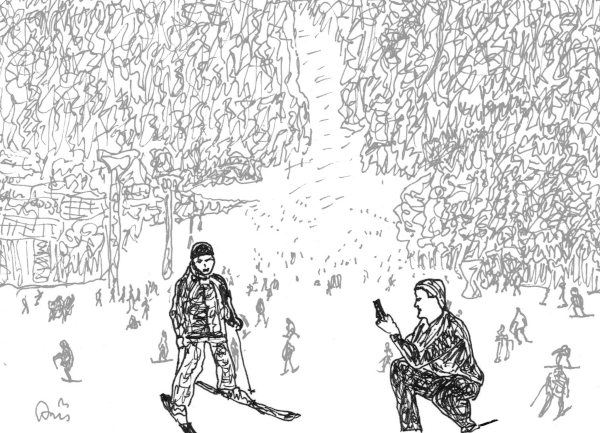 |
(Italiano) Durante i dodici giorni in mare, Helmut non riesce a riposare. Si sente monitorato e deluso. Heinz lo porta a fare sport per tirarlo su di morale. Si trovano in un ambiente pittoresco, ma poi Heinz perde il controllo... |
(Deutsch) In den zwölf Tagen auf See kommt Helmut nicht zur Ruhe. Er fühlt sich überwacht und enttäuscht. Heinz geht mit ihm zum Sport, um ihn aufzumuntern. Sie finden sich in einer pittoresken Umgebung wieder, doch dann verliert Heinz die Kontrolle ... Normal Version | ||
Wintersport Tag 18 1 Heinz: Du grübelst jetzt schon über eine Woche. Nun genieß die Zeit doch wenigstens ein bisschen! |
Winter Sports Day 18 Heinz: You've been brooding for over a week now. Just enjoy the time a little bit! |
Sports d'Hiver Jour 18 Heinz : Cela fait plus d'une semaine que tu cogites. Profite au moins un peu de ce temps ! |
Giorno 18 Heinz: È da più di una settimana che stai rimuginando. Goditi almeno un po' il tempo! |
Día 18 Heinz: Llevas más de una semana rumiando. ¡Disfruta al menos un poco del tiempo! |
2 Helmut: Wie gesagt, ich hab den mal bei einer Übung gesehen, aber das ist auch schon alles. |
Helmut: Like I said, I saw him once during an exercise, that's all. |
Helmut : Comme je l'ai dit, je l'ai vu une fois pendant un exercice, c'est tout. |
Helmut: Come ho detto, l'ho visto una volta durante un'esercitazione, ma questo è tutto. |
Helmut: Como ya he dicho, le vi una vez durante un ejercicio, pero eso es todo. |
3 Heinz: Und da, eine Schlittschuhbahn! |
Heinz: And there, a skating rink! |
Heinz : Et là, une patinoire ! |
Heinz: E lì, una pista di pattinaggio! |
Heinz: ¡Y ahí, una pista de patinaje! |
4 Helmut: Ich hab dich gleich eingeholt. Schipp |
Helmut: I'll catch up with you in a second. Shove |
Helmut : Je te rattrape tout de suite. Chip |
Helmut: Ti raggiungo subito. Cipp |
Helmut: Te alcanzaré en un segundo. Ship |
5 Heinz: Ich hab keine Luft mehr gekriegt. |
Heinz: I couldn't breathe anymore. |
Heinz : Je pouvais plus respirer. |
Heinz: Non riuscivo più a respirare. |
Heinz: Ya no podía respirar. |
(English) The Boys use their short stay in Mumbai for a stroll through the market streets. Helmut takes precautions to prevent Heinz from doing anything stupid, but then he takes a significant risk himself. In the end, they are three. |
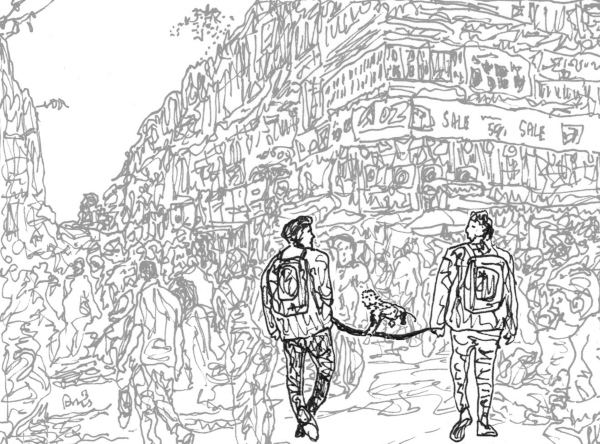 |
(Italiano) I ragazzi approfittano del loro breve soggiorno a Mumbai per fare una passeggiata nelle strade del mercato. Helmut prende delle precauzioni per evitare che Heinz faccia qualche stupidaggine, ma poi corre lui stesso un rischio notevole. Alla fine sono in tre. |
(Deutsch) Ihren kurzen Aufenthalt in Mumbai nutzen die Jungs für einen Spaziergang durch die Marktstraßen. Helmut ergreift Vorsichtsmaßnahmen, um Heinz vor Dummheiten zu bewahren, doch dann geht er selbst ein beträchtliches Risiko ein. Am Ende sind sie zu dritt. Normal Version | ||
Tag 22 1 Heinz: Hier, eine Wasserflasche für dich. Das ist wichtig. Keinesfalls aus dem Hahn trinken, hörst du? |
Day 22 Heinz: Here, a water bottle for you. This is important. Under no circumstances drink from the tap, you hear? |
Jour 22 Heinz : Tiens, une bouteille d'eau pour toi. C'est important. Ne pas boire au robinet, tu entends ? |
Giorno 22 Heinz: Ecco una bottiglia d'acqua per te. È molto importante. Non bere dal rubinetto, capito? |
Día 22 Heinz: Toma, una botella de agua para ti. Es muy importante. No bebas del grifo, ¿me oyes? |
2 Helmut: Ein bisschen Vorsicht kann der Porzellankiste nicht schaden. Sieh mal das Äffchen! Ha ha ha! |
Helmut: A bit of discretion is better than some part of valor. Oh, look at the little monkey! Ha ha ha! |
Helmut : Prudence n'est sûrement pas merde... c'est sûrement mère de sûreté. Oh, regarde le petit singe ! Ha ha ha ! |
Helmut: La prudenza mai non stoppa. Oh, guarda la scimmietta! Ha ha ha! |
Helmut: Un poco de precaución es mejor que curar. Oh, ¡mira al monito! ¡Ja, ja, ja! |
3 Heinz: Ausrutschen? Mann, du hast mich gezogen und ich bin über diesen Herrn hier gefallen, der Äpfel verkauft. Menschenquäler! Überall Äpfel auf der Straße! Namastee, namastee! Hier bitte, lassen Sie mich den Schaden bezahlen, nehmen Sie das! |
Heinz: Slip? Man, you pulled me and I fell over this gentleman here who sells apples. Man abuser! Apples all over the street! Namaste, namaste! Here you go, let me pay for the damage, take this! |
Heinz : Glisser ? Mec, tu m'as tiré et je suis tombé sur ce monsieur ici qui vend des pommes. Tortionnaire d'humains, toi ! Des pommes partout dans la rue ! Namaste, namaste ! Tenez, laissez-moi payer les dégâts, prenez ça ! |
Heinz: Scivolare? Amico, mi hai tirato e sono caduto su questo signore che vende mele. Maltrattatore di persone! Mele per tutta la strada! Namaste, namaste! Ecco, mi lasci pagare i danni, prenda questo! |
Heinz: ¿Resbalar? Tío, has tirado de mí y me he caído encima de este señor de aquí que vende manzanas. ¡Maltratador de personas! ¡Manzanas por todas partes en la calle! ¡Namaste, namaste! Tenga, déjeme pagar los daños, ¡tome esto! |
4 Heinz: Ts, jetzt tanzt er auf dem Seil zwischen uns. Vielleicht können wir mit der Nummer auftreten. |
Heinz: Ts, now he's dancing on the rope between us. Maybe we can do an act with that. |
Heinz : Ts, maintenant il danse sur la corde entre nous. On pourrait peut-être faire un numéro avec ça. |
Heinz: Ts, ora sta ballando sulla corda che ci separa. Forse possiamo fare un numero con quello. |
Heinz: Ts, ahora está bailando en la cuerda entre nosotros. Quizá podamos hacer un número con eso. |
5 Helmut: Außerdem hat Max zwei vertrauenswürdige Kontaktpersonen gefunden, die uns in Kalkutta erwarten. Die haben ein anständiges Boot und bringen uns weiter. |
Helmut: Besides, Max has found two trustworthy contacts who are waiting for us in Calcutta. They have a decent boat and will take us further. |
Helmut : En plus, Max a trouvé deux contacts de confiance qui nous attendent à Calcutta. Ils ont un bateau digne de ce nom et nous feront avancer. |
Helmut: Inoltre, Max ha trovato due contatti affidabili che ci aspettano a Calcutta. Hanno una barca decente e ci porteranno avanti. |
Helmut: Además, Max ha encontrado dos contactos de confianza que nos esperan en Calcuta. Tienen un barco decente y nos llevarán más lejos. |
6 Heinz: Was machst du? Du kannst die doch nicht so in deinen Rucksack stopfen! |
Heinz: What are you doing? You can't stuff her in your backpack like that! |
Heinz : Qu'est-ce que tu fais ? Tu ne peux pas la fourrer comme ça dans ton sac à dos ! |
Heinz: Cosa stai facendo? Non puoi ficcarla nello zaino in questo modo! |
Heinz: Heinz: ¿Qué haces? ¡No puedes embutirla así en tu mochila! |
(English) From Mumbai it's non-stop across India to Calcutta. Non-stop? Not quite. Heinz sleepwalks and gets off at a stop halfway, while cheerfully singing songs. Helmut just manages to catch up, but the trouble is only just beginning... |
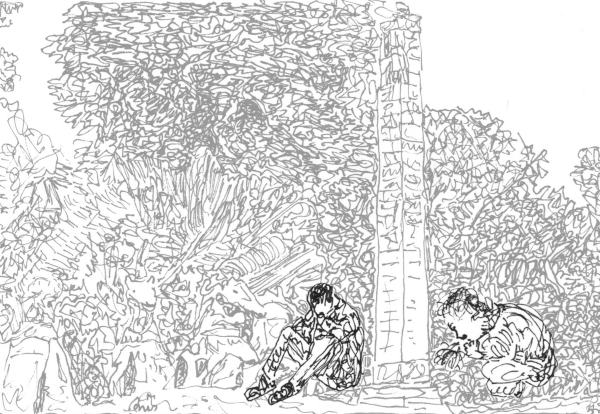 |
(Italiano) Da Mumbai si attraversa l'India senza scalo fino a Calcutta. Senza scalo? Non proprio. Heinz è sonnambulo e scende a una fermata a metà del viaggio, mentre canta allegramente delle canzoni. Helmut riesce a raggiungerlo, ma i problemi sono solo all'inizio... |
(Deutsch) Von Mumbai geht es nonstop quer durch Indien nach Kalkutta. Nonstop? Nicht ganz. Heinz schlafwandelt und steigt an einer Haltestelle auf halber Strecke aus, während er fröhlich Lieder singt. Helmut kommt gerade noch hinterher, aber jetzt fangen die Schwierigkeiten erst an ... Normal Version | ||
Tag 23 1 Heinz: Ah, da sind wir ja. Komm, Helmut! |
Day 23 Heinz: Ah, we are there. Come on, Helmut! |
Jour 23 Heinz : Ah, nous y sommes. Viens, Helmut ! |
Giorno 23 Heinz: Ah, eccoci qui. Vieni, Helmut! |
Día 23 Heinz: Ah, aquí estamos. ¡Vamos, Helmut! |
2 Helmut: Was ist bloß los mit dir? Wohin läufst du denn? |
Helmut: What's wrong with you? Where are you running? |
Helmut : Qu'est-ce qui ne va pas chez toi ? Où vas-tu donc ? |
Helmut: Cosa c'è che non va in te? Dove stai andando? |
Helmut: ¿Qué te pasa? ¿Adónde corres? |
3 Heinz: Danke. Kannst du mir mal erklären, was du wieder angestellt hast? |
Heinz: Thanks. Can you explain to me what you've done again? |
Heinz : Merci. Peux-tu m'expliquer ce que tu as encore fait ? |
Heinz: Grazie. Puoi spiegare cosa hai fatto adesso? |
Heinz: Gracias. ¿Puedes explicar ahora lo que hiciste? |
4 Heinz: Lass uns zurück zum Bahnhof gehen. |
Heinz: Let's go back to the station. |
Heinz : Retournons à la gare. |
Heinz: Torniamo alla stazione. |
Heinz: Volvamos a la estación. |
5 Heinz: Hm. Der Kreis ist also geschlossen. |
Heinz: Hm. So the circle is closed then. |
Heinz : Hm. Donc la boucle est bouclée. |
Heinz: Hm. Quindi il cerchio si chiude. |
Heinz: Hm. Entonces el círculo está cerrado. |
(English) A little late, the boys meet their contacts Amita and Ankita. After an eventful visit to a restaurant, they drive to the twins' home to spend the night. Helmut impresses Heinz once again with his multiple skills as he gets everyone safely through the traffic. |
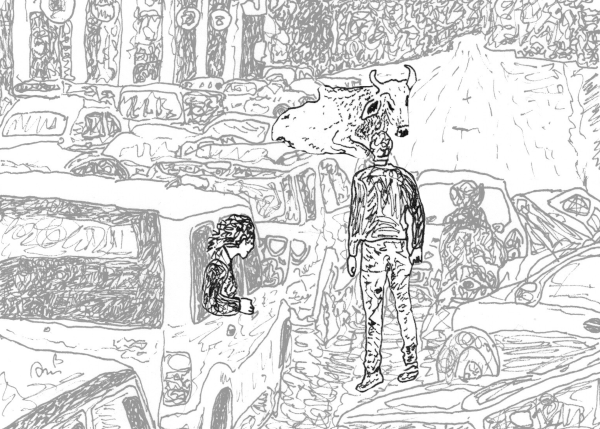 |
(Italiano) Un po' in ritardo, i ragazzi incontrano i loro contatti Amita e Ankita. Dopo una visita movimentata al ristorante, si recano a casa delle gemelle per passare la notte. Helmut impressiona ancora una volta Heinz con le sue molteplici abilità quando riesce a far passare tutti in sicurezza nel traffico. |
(Deutsch) Ein wenig verspätet treffen die Jungs auf ihre Kontaktpersonen Amita und Ankita. Nach einem ereignisreichen Restaurantbesuch fahren sie zu den Zwillingen nach Hause, um dort die Nacht zu verbringen. Helmut beeindruckt Heinz erneut mit seinen multiplen Fähigkeiten, als er alle sicher durch den Verkehr bringt. Normal Version | ||
Tag 25 1 Helmut: Welche war noch mal Amita? |
Day 25 Helmut: Which one was Amita again? |
Jour 25 Helmut : Laquelle est Amita, déjà ? |
Giorno 25 Helmut: Qual è Amita, già? |
Día 25 Helmut: ¿Cuál era Amita? |
2 Helmut: Ich glaub, da war Amita schon draußen. Aber vielleicht hat sie da weitergeflucht, das kann sein. |
Helmut: I think Amita was already outside by then. But maybe she kept on swearing, that's possible. |
Helmut : Je pense qu'Amita était déjà dehors à ce moment-là. Mais peut-être qu'elle a continué à jurer, c'est possible. |
Helmut: Credo che Amita fosse già fuori a quel punto. Ma forse ha continuato a imprecare, è possibile. |
Helmut: Creo que Amita ya estaba fuera en ese momento. Pero quizá siguió maldiciendo, es posible. |
3 Helmut: Zu fünft. Ja gut, so viel hatte ich schon selbst verstanden. Was ist denn ihr Hintergrund? Hey, wir stehen hier aber schon lange. Ist das ein Bahnübergang oder was? |
Helmut: The five of us. Yeah, well, I already understood that much myself. What's their background? Hey, we've been standing here for quite some time now. Is this a railroad crossing or something? |
Helmut : Tous les cinq. Oui, bon, j'avais déjà compris ça tout seul. Mais quel est leur profil ? Hé, ça fait longtemps qu'on est là. C'est un passage à niveau ou quoi ? |
Helmut: Noi cinque. Sì, beh, l'avevo capito da solo. Ma qual è il loro profilo? Ehi, siamo qui da un bel po' di tempo. È un passaggio a livello o cosa? |
Helmut: Los cinco. Sí, bueno, ya me lo había imaginado. Pero, ¿cuál es su perfil? Oye, llevamos aquí mucho tiempo. ¿Es un paso a nivel o algo así? |
4 Helmut: Jetzt warte doch mal. Hey, da vorne steht eine Kuh auf der Straße. |
Helmut: Now wait a minute. Hey, there's a cow on the road up ahead. |
Helmut : Mais attends un peu. Hé, il y a une vache sur la route devant nous. |
Helmut: Aspetta un attimo. Ehi, c'è una mucca sulla strada davanti a noi. |
Helmut: Espera un momento. Eh, hay una vaca en la carretera, ahí delante. |
5 Helmut: Komm her zu uns, Aouda, sag der Dame Guten Tag! |
Helmut: Come over here, Aouda, say hello to the lady! |
Helmut : Viens ici chez nous, Aouda, dis bonjour à la dame ! |
Helmut: Vieni qui, Aouda, saluta la signora! |
Helmut: ¡Ven aquí, Aouda, saluda a la señora! |
6 Helmut: Winke winke! Komm, Aouda, mach winke, winke zu den Leuten. Ja, schön machst du das! |
Helmut: Hi everybody! Come on, Aouda, make wavey wavey to the people. Yes, that's great the way you do it! |
Helmut : Salut tout le monde ! Allez, Aouda, fais coucou aux gens. Oui, c'est super comme tu le fais ! |
Helmut: Ciao a tutti! Dai, Aouda, fai ciao ciao alla gente. Sì, stai andando alla grande! |
Helmut: ¡Hola a todos! Vamos, Aouda, haz adiós con la mano. Sí, ¡lo estás haciendo muy bien! |
(English) The motorboat sails to the Andaman and Nicobar Islands in two days, and what two days those are! Heinz and Helmut want to recover from their exertions by diving. While doing so, they make an amazing discovery that greatly facilitates their onward journey with the twins. |
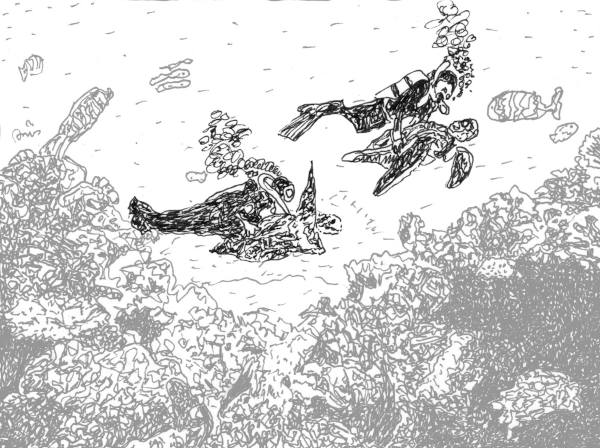 |
(Italiano) Il motoscafo viaggia per due giorni verso le Isole Andamane e Nicobare, e che due giorni! Heinz e Helmut vogliono riprendersi dalle fatiche immergendosi sott'acqua. Durante l'immersione, fanno una scoperta incredibile che rende molto più facile il proseguimento del viaggio con i gemelli. |
(Deutsch) Zwei Tage fährt das Motorboot bis zu den Andamanen und Nikobaren, und was für zwei Tage das sind! Heinz und Helmut wollen sich beim Tauchen unter Wasser von den Strapazen erholen. Dabei machen sie einen erstaunlichen Fund, der ihnen die Weiterfahrt mit den Zwillingen sehr erleichtert. Normal Version | ||
Tag 28 1 Helmut: Andamanen und Nikobaren. |
Day 28 Helmut: Andaman and Nicobar. |
Jour 28 Helmut : Andaman-et-Nicobar. |
Giorno 28 Helmut: Andamane e Nicobare. |
Día 28 Helmut: Andamán y Nicobar. |
2 Helmut: Nee, die sind unten. Ich bin froh, dass genug Platz auf dem Boot ist. |
Helmut: No, they're downstairs. I'm glad there's enough room on the boat. |
Helmut : Non, elles sont en bas. Je suis content qu'il y ait assez de place sur le bateau. |
Helmut: No, sono di sotto. Sono contento che ci sia abbastanza spazio sulla barca. |
Helmut: No, están abajo. Me alegro de que haya espacio suficiente en el barco. |
3 Helmut: Lass uns also eintauchen in eine andere Welt und für eine Stunde alles vergessen! |
Helmut: So let us dive into another world now and forget everything for an hour! |
Helmut : Plongeons donc dans un autre monde et oublions tout pendant une heure ! |
Helmut: Allora immergiamoci in un altro mondo e dimentichiamo tutto per un'ora! |
Helmut: ¡Así que vamos a sumergirnos en otro mundo y olvidarnos de todo durante una hora! |
4 Helmut: Bieh. Da, Riesenschildkröten! Pchchch |
Helmut: Beeh. There, giant tortoises! Pkhkhkh |
Helmut : Bii. Voilà, des tortues géantes ! Pkhkhkh |
Helmut: Bii. Ecco, tartarughe giganti! Pkhkhkh |
Helmut: Bii. Ahí, ¡tortugas gigantes! Pkhkhkh |
5 Helmut: Ah, da kommt Amita. Ihr Gesicht ist irgendwie anders. |
Helmut: Ah, there comes Amita. Her face looks different somehow. |
Helmut : Ah, voilà Amita. Son visage est différent en quelque sorte. |
Helmut: Ah, ecco Amita. Il suo viso è diverso in qualche modo. |
Helmut: Ah, aquí viene Amita. Su cara es algo diferente. |
6 Helmut: Hm. Und wieso stürzt Ankita jetzt strahlend vom Unterdeck auf uns zu? |
Helmut: Hm. And why is Ankita dashing towards us from the lower deck now, beaming? |
Helmut : Hum. Et pourquoi Ankita se précipite-t-elle vers nous du pont inférieur, rayonnante ? |
Helmut: Hm. E perché Ankita si sta precipitando verso di noi dal ponte inferiore, raggiante? |
Helmut: Hm. ¿Y por qué está Ankita corriendo hacia nosotros desde la cubierta inferior, radiante? |
(English) Sailing through the Strait of Malacca, Heinz loses his nerve during a game of chess on board. He is only just able to tell Helmut what troubles him before they are surprised by a storm. |
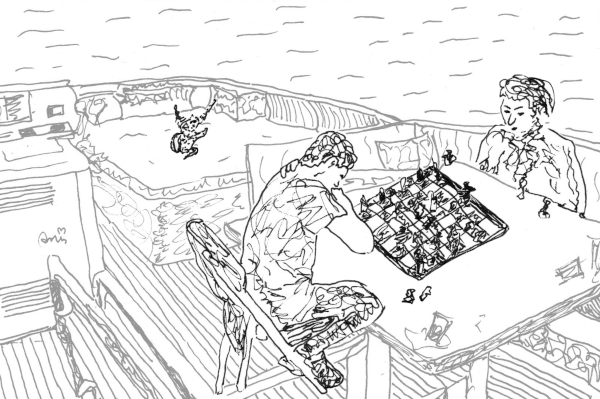 |
(Italiano) Navigano attraverso lo Stretto di Malacca. Heinz perde i nervi durante una partita a scacchi a bordo. Riesce appena a dire a Helmut ciò che gli passa per la testa prima che vengano sorpresi da una bufera. |
(Deutsch) Sie fahren durch die Straße von Malakka. Bei einer Schachpartie an Bord verliert Heinz die Nerven. Er kann Helmut gerade noch berichten, was ihm auf der Seele liegt, bevor die beiden von einem Unwetter überrascht werden. Normal Version | ||
Tag 29 1 Helmut: Heinz, kuck mal, was ich hier habe! Aua, Mann, immer stolper ich über diese Miststufe! |
Day 29 Helmut: Heinz, look what I've got here! Ouch, man, I always trip over this damn step! |
Jour 29 Helmut : Heinz, regarde ce que j'ai là ! Aïe, flûte, je trébuche toujours sur cette marche de fumier ! |
Giorno 29 Helmut: Heinz, guarda cosa ho qui! Ahi, cavolo, inciampo sempre in questo dannato gradino! |
Día 29 Helmut: ¡Heinz, mira lo que tengo aquí! Ay, tío, ¡siempre tropiezo con este maldito escalón! |
2 Heinz: Du bist dra-han! |
Heinz: Yoooour turn! |
Heinz : Hé, à toi ! |
Heinz: Tocca a tee-ee! |
Heinz: ¡Hee, tu turno! |
3 Heinz: Mann, ich will auch so eine Mystery-Fähigkeit haben! |
Heinz: Man, I also wanna have a mystery ability like that! |
Heinz : Moi aussi, je veux avoir une compétence mystère comme ça ! |
Heinz: Boia, anch'io vorrei avere un potere del mistero come quella! |
Heinz: ¡Tío, yo también quiero tener una habilidad misteriosa como esa! |
4 Helmut: Den Schuh! Warte, ich komme. Wuuusch prassel prass |
Helmut: The shoe! Hold on, I'm coming. Wooooosh prassle prass |
Helmut : La chaussure ! Attends, j'arrive. Wouuuuuuch prassle prasse |
Helmut: La scarpa! Aspetta, sto arrivando. Vuuush pras plas |
Helmut: ¡El zapato! Espera, ya voy. Vuuush plada-plad |
(English) The boys are buying provisions in Singapore while the twins sleep on board. Heinz uses a shoe to explain to his friend that he had an epiphany during the storm, but Helmut encounters a little mishap at the tasting booth that distracts him. His original plan was to be extra careful! |
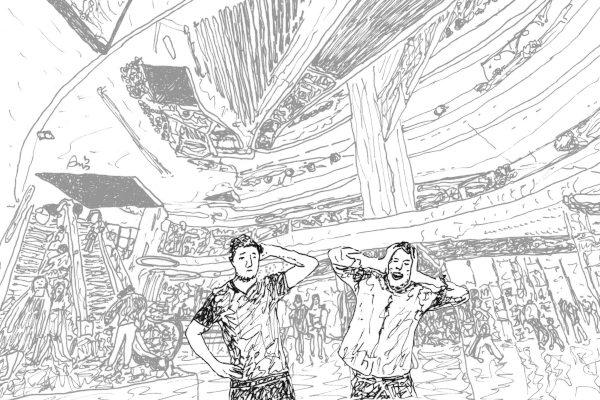 |
(Italiano) I ragazzi fanno scorta di provviste a Singapore, mentre i gemelli dormono a bordo. Heinz usa una scarpa per spiegare all'amico che ha avuto un'epifania durante la tempesta, ma Helmut incontra un piccolo incidente al banco di degustazione che lo distrae. Il suo piano originale era di essere molto prudente! |
(Deutsch) Die Jungs besorgen Proviant in Singapur, während die Zwillinge an Bord schlafen. Anhand eines Schuhs will Heinz seinem Freund erklären, dass er im Sturm eine Erleuchtung hatte, aber Helmut geschieht am Probierstand ein kleines Unglück, das ihn ablenkt. Dabei wollte er dieses Mal doch aufpassen! Normal Version | ||
Tag 30 1 Helmut: Ja, das ist bequem. Super. ♫ I'm singing in the rain ... |
Day 30 Helmut: Yes, that's very comfortable. Super. ♫ I'm singing in the rain... |
Jour 30 Helmut : Oui, c'est très confortable. Super. ♫ I'm singing in the rain... |
Giorno 30 Helmut: Sì, è molto comodo. Super. ♫ I'm singing in the rain... |
Día 30 Helmut: Sí, es muy cómodo. Super. ♫ I'm singing in the rain... |
2 Helmut: Naja, äh, vielleicht ... Ich will jedenfalls um Gottes Willen nichts falsch machen. Deshalb bin ich auch nur an Ampeln über die Straße gegangen. Sonst wird man nämlich bestraft. |
Helmut: Well, uh, maybe... In any case, I really don't want to do anything wrong. That's why I only crossed the road at traffic lights. Otherwise you get punished. |
Helmut : Eh bien, euh, peut-être... En tout cas, je ne veux vraiment pas faire quelque chose de mal. C'est pourquoi je n'ai traversé la route qu'au feu. Sinon, on est puni. |
Helmut: Beh, eh, forse... In ogni caso, non voglio fare nulla di male, per carità. Ecco perché ho attraversato la strada solo ai semafori. Altrimenti si viene puniti. |
Helmut: Bueno, eh, quizá... En cualquier caso, no quiero hacer nada malo, por Dios. Por eso solo crucé la calle en los semáforos. Si no, te castigan. |
3 Heinz: Wie liegen wir eigentlich in der Zeit? |
Heinz: How are we doing in terms of time? |
Heinz : Alors, où en est-on en termes de temps ? |
Heinz: Allora, come siamo messi in termini di tempo? |
Heinz: Entonces, ¿dónde estamos en cuanto a tiempo? |
4 Heinz: Der Bruder dieses Schuhs hier ist in einer Krisensituation über Bord gesegelt, du erinnerst dich. |
Heinz: The brother of this shoe here sailed overboard in a crisis situation, you remember. |
Heinz : La sur de cette chaussure ci a navigué par-dessus bord en situation de crise, tu te souviens. |
Heinz: La sorella di questa scarpa qui ha volato in mare in una situazione di crisi, ti ricordi? |
Heinz: El hermano de este zapato navegó por la borda en una situación de crisis, ¿recuerdas? |
5 Heinz: Ja, und dass Tiere so auf dich reagieren, bedeutet, dass du spirituell weit gekommen bist. |
Heinz: Yes, and the fact that animals react to you like that means that you've come a long way spiritually. |
Heinz : Oui, et le fait que les animaux réagissent ainsi à ton égard signifie que tu as fait un grand pas en avant sur le plan spirituel. |
Heinz: Sì, e il fatto che gli animali reagiscano a te in questo modo significa che hai fatto molta strada a livello spirituale. |
Heinz: Sí, y el hecho de que los animales reaccionen así ante ti significa que has avanzado mucho en el plano espiritual. |
6 Heinz: Milch! Hier, nimm das, ach, Mist, die Hälfte verschüttet. |
Heinz: Milk! Here, take this, oh crap, half of it spilled. |
Heinz : Du lait ! Tiens, prends ça, oh merde, la moitié s'est renversée. |
Heinz: Latte! Tieni, prendi questo... oh merda, se ne è versato metà! |
Heinz: ¡Leche! Toma, coge esto, oh mierda, se ha derramado la mitad. |
(English) Helmut wants to know more about his mysterious abilities and conducts maritime experiments. Heinz is skeptical at first, but in the end no one, not even the twins and Aouda, cease to be amazed. What a guy, this Helmut! |
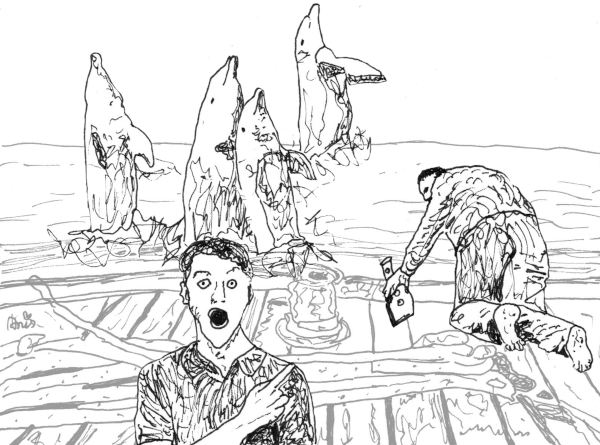 |
(Italiano) Helmut vuole saperne di più sui suoi misteriosi poteri e conduce esperimenti marittimi. Heinz all'inizio è scettico, ma alla fine nessuno, nemmeno i gemelli e Aouda, riesce a smettere di stupirsi. Che ragazzo, questo Helmut! |
(Deutsch) Helmut möchte mehr wissen über seine geheimnisvollen Fähigkeiten und stellt maritime Experimente an. Heinz ist erst skeptisch, aber am Ende kommt keiner aus dem Staunen heraus, selbst die Zwillinge und Aouda nicht. Also dieser Helmut! Normal Version | ||
Tag 32 1 Helmut: So, jetzt ist alles geregelt. Mach mal Platz, bitte. |
Day 32 Helmut: So, now everything is settled. Make some room, please. |
Jour 32 Helmut : Voilà, tout est réglé. Fais de la place, s'il te plaît. |
Giorno 32 Helmut: Bene, questo è quanto. Tutto è sistemato. Fai un po' di spazio, per favore. |
Día 32 Helmut: Ya está todo arreglado. Haga sitio, por favor. |
2 Heinz: Und wer ist das? |
Heinz: And who is that? |
Heinz : Et qui est-ce ? |
Heinz: E chi è? |
Heinz: ¿Y quién es él? |
3 Helmut: Ich würde gern mehr darüber wissen. Vielleicht kann ich mit den Buckelwalen singen oder so. |
Helmut: I'd like to know more about it. Maybe I can sing with the humpback whales or something. |
Helmut : J'aimerais en savoir plus. Peut-être que je peux chanter avec les baleines à bosse ou quelque chose comme ça. |
Helmut: Mi piacerebbe saperne di più. Forse potrei cantare con le megattere o qualcosa del genere. Heinz: Non lasciamoci trasportare. Osserviamo le cose e basta. Helmut: Per esempio, se taglio il fondo di questa bottiglia di plastica... Heinz: Cosa vuoi fare? Helmut: ...e faccio qualche buco sul lato... Ahi, maledetto accendino! Quindi... Heinz: Impressionante. Helmut: Cosa ho allora? Heinz: Un danno cerebrale. Helmut: Un flauto di megattera. Heinz: Certo, un flauto di megattera. Eccellente! Helmut: È solo un esperimento. Pensavo che volessi incoraggiarmi. Heinz: Sì, certamente. C'era un pizzico di ironia nella mia voce? Non era intenzionale. Helmut: Questo è un buon posto. Mi sdraierò qui a pancia in giù, così. Cosa c'è? Heinz: Niente. Non ho detto nulla. Ma prima fermiamo la barca. AMITA, STOP THE BOAT!! Helmut: Devi tenermi fermo così non cado in acqua. |
Helmut: Me gustaría saber más sobre ello. Quizá pueda cantar con las ballenas jorobadas o algo así. |
4 Heinz: Was immer du sagst. OK, ich hab dich. S-T-O-P-T-H-E ... ah, sie hat's gehört. |
Heinz: Whatever you say. OK, I've got you. S-T-O-P-T-H-E... ah, she heard me. |
Heinz : Comme tu veux. OK, je te tiens. S-T-O-P-T-H-E... ah, elle m'a entendu. |
Heinz: Come vuoi tu. OK, ti tengo io. S-T-O-P-T-H-E... ah, mi ha sentito. |
Heinz: Lo que tú digas. Vale, ya te tengo. S-T-O-P-T-H-E... ah, me ha oído. |
5 Heinz: Ts. Klar, ich hol ihn dir, äh, euch. Na, Aouda, da staunst du, was? Was der Papa da im Wasser macht. |
Heinz: Tsk. Sure, I'll get it for you, uh, y'all. Well, Aouda, you're amazed, aren't you? What is Daddy doing in the water? |
Heinz : Ts. Bien sûr, je vais le chercher pour toi, euh, vous. Alors, Aouda, tu es étonnée, hein ? Qu'est-ce que papa fait dans l'eau ? |
Heinz: Ts. Certo, te, ehm, ve la prendo io. Allora, Aouda, sei sorpresa, eh? Cosa ci fa papà nell'acqua? |
Heinz: Ts. Claro, te... eh, os la traeré. Así que, Aouda, estás sorprendida, ¿eh? ¿Qué hace papá en el agua? |
6 Heinz: Ha, er hat den Ball ins Boot genast und Aouda hat ihn aufgefangen. Die ist immer noch ganz verdattert. |
Heinz: Ha, he's nosed the ball into the boat and Aouda has caught it. She's still completely flabbergasted. |
Heinz : Ha, il a nezé la balle dans le bateau et Aouda l'a attrapée. Elle est toujours complètement abasourdie. |
Heinz: Ha, ha nasato la palla in barca e Aouda l'ha presa. È ancora completamente sbalordita. |
Heinz: Ja, ha narizado la pelota al bote y Aouda la ha cogido. Sigue completamente atónita. |
(English) In Hong Kong, the boys are taken into the care of Jack, who grants them an exquisite stay. Except when it comes to this strange group activity, because that's getting a bit too much for Heinz. Helmut can't tell him what's really behind it, because his mind is elsewhere. |
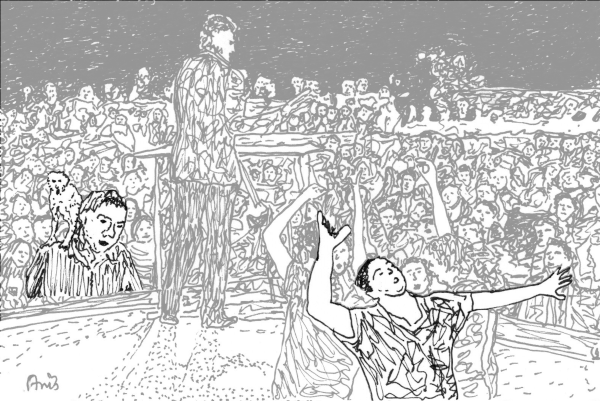 |
(Italiano) A Hong Kong, i ragazzi vengono affidati alle cure di Jack, che offre loro un soggiorno squisito. Tranne quando si tratta di questa strana attività di gruppo, perché è un po' troppo per Heinz. Helmut non può dirgli il vero contesto, perché la sua mente è altrove. |
(Deutsch) In Hongkong kommen die Jungs in die Obhut von Jack, der ihnen einen exquisiten Aufenthalt beschert. Außer, was diese seltsame Gruppenaktivität angeht, denn das wird Heinz ein bisschen zu viel. Was wirklich dahintersteckt, kann Helmut ihm nicht sagen, denn er ist mit den Gedanken anderswo. Normal Version | ||
Tag 33 1 Heinz: Wie im Paradies ist das! Ich kann es immer noch nicht fassen: die unkomplizierte Einreise, der Palast, das Fünf-Gänge-Menü, die Tänzer und Schattenspieler ... |
Day 33 Heinz: It's like paradise! I still can't believe it: the uncomplicated entry, the palace, the five-course meal, the dancers and shadow puppeteers... |
Jour 33 Heinz : C'est le paradis ! Je n'arrive toujours pas à y croire : l'entrée sans complications, le palais, le repas à cinq plats, les danseurs et les marionnettistes d'ombres... |
Giorno 33 Heinz: È come un paradiso! Non riesco ancora a crederci: l'ingresso semplice, il palazzo, il pasto di cinque portate, i ballerini e i burattinai... |
Día 33 Heinz: ¡Es como el paraíso! Todavía no me lo creo: la entrada sin complicaciones, el palacio, la comida de cinco platos, los bailarines y los titiriteros de sombras... |
2 Heinz: Sieht unscheinbar aus. Und was erwartet uns da genau? Du sagtest, eine Veranstaltung? |
Heinz: Looks inconspicuous. And what exactly is waiting for us there? You said an event? |
Heinz : Il a l'air discret. Et qu'est-ce qui nous y attend exactement ? Tu as parlé d'un événement ? |
Heinz: Sembra poco appariscente. E cosa ci aspetta esattamente lì? Hai detto un evento? |
Heinz: Parece discreto. ¿Y qué nos espera allí exactamente? ¿Has dicho un evento? |
3 Helmut: Das war ihr super peinlich. Hier, nimm die Kerze. Wir treten ein. |
Helmut: She was super embarrassed. Here, take the candle. We enter. |
Helmut : Elle était super gênée. Tiens, prends la bougie. Nous entrons. |
Helmut: Era davvero imbarazzata. Ecco, prendi la candela. Entriamo. |
Helmut: Estaba super avergonzada. Toma, coge la vela. Entramos. |
4 Heinz: Und worum geht es in den Reden? Ist das was Religiöses? |
Heinz: And what are the speeches about? Is it something religious? |
Heinz : Et de quoi parlent les discours ? Est-ce que c'est religieux ? |
Heinz: E di cosa parlano i discorsi? È qualcosa di religioso? |
Heinz: ¿Y de qué tratan los discursos? ¿Es algo religioso? |
5 Helmut: Mann, hör doch erst mal zu! Es ist ein Bund, eine weltweite Interessensgemeinschaft. Na und? |
Helmut: Man, listen to me first! It's a union, a worldwide community of interests. So what? |
Helmut : Mec, écoute d'abord ! C'est une confédération, une communauté d'intérêts mondiale. Et alors ? |
Helmut: Amico, ascoltami prima! È un'unione, una comunità di interessi mondiale. E allora? |
Helmut: ¡Amigo, escúchame primero! Es una unión, una comunidad mundial de intereses. ¿Y qué? |
6 Helmut: OK, Jack, da bin ich. |
Helmut: OK, Jack, here I am. |
Helmut : OK, Jack, je suis là. |
Helmut: Ok, Jack, eccomi qui. |
Helmut: Vale, Jack, aquí estoy. |
(English) Heinz likes the breakfast the next morning, better than the secret Helmut tells him about. At least he gets two private guides to show him the city, because Helmut has a lot to do. They agree to meet the next day on the boat to Yokohama. |
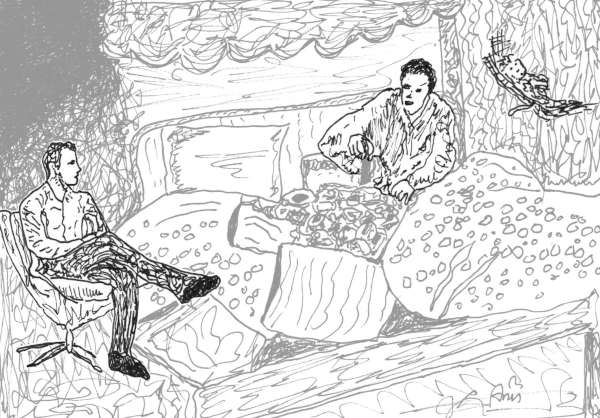 |
(Italiano) A Heinz piace la colazione del mattino dopo, meglio del segreto di cui Helmut gli parla. Almeno ha due guide private per mostrargli la città, perché Helmut ha molto da fare. Si accordano per rivedersi il giorno dopo sulla nave per Yokohama. |
(Deutsch) Das Frühstück am nächsten Morgen gefällt Heinz gut, besser als das Geheimnis, von dem ihm Helmut erzählt. Immerhin bekommt er zwei private Touristenführer, die ihm die Stadt zeigen, denn Helmut hat viel zu tun. Sie wollen sich tags darauf auf dem Schiff nach Yokohama wiedertreffen. Normal Version | ||
Tag 34 1 Helmut: Klopf klopf, bist du wach? |
Day 34 Helmut: Knock knock, are you awake? |
Jour 34 Helmut : Toc toc, tu es réveillé ? |
Giorno 34 Helmut: Toc toc, sei sveglio? |
Día 34 Helmut: Toc toc, ¿estás despierto? |
2 Heinz: Kein Wunder, dass ich mich aufrege. Ich lauf mit so einem Sektenheini durch die Gegend. |
Heinz: No wonder I'm getting upset. I'm walking around with a cult nut. |
Heinz : Pas étonnant que je m'énerve. Je me promène avec un cinglé de secte. |
Heinz: Non c'è da meravigliarsi se mi sto arrabbiando. Me ne vado in giro con un tipo da setta. |
Heinz: No es extraño que me enfade. Voy por ahí con un tipo de secta así. |
3 Heinz: Fangen wir noch mal ganz von vorne an! |
Heinz: Let's start from the beginning! |
Heinz : Reprenons depuis le début ! |
Heinz: Ricominciamo da capo! |
Heinz: ¡Empecemos de nuevo! |
4 Heinz: Und was machen die in der Loge? |
Heinz: And what do they do in the Lodge? |
Heinz : Et que font-ils dans la Loge ? |
Heinz: E cosa fanno nella Loggia? |
Heinz: ¿Y qué hacen en la Logia? |
5 Helmut: Die Karriere. Nachdem meine Arbeit für die alliierten Truppen nicht mehr gesichert ist ... |
Helmut: The career. Now that my work for the allied troops is no longer secure... |
Helmut : Pour ma carrière. Maintenant que mon travail avec les troupes alliées n'est plus assuré... |
Helmut: Per la mia carriera. Ora che il mio lavoro con le truppe alleate non è più assicurato... |
Helmut: Por mi carrera. Ahora que mi trabajo para las tropas aliadas ya no es seguro... |
6 Heinz: Was ist denn das für ein seltsames Ticket? |
Heinz: What kind of strange ticket is that? |
Heinz : Qu'est-ce que c'est que ce drôle de billet ? |
Heinz: Che biglietto strano è questo? |
Heinz: ¿Qué clase de billete extraño es ése? |
(English) Fate has some unexpected obstacles in store for the Boys: While Heinz faces some tough challenges on board the freighter to Japan, Helmut discovers a mysterious giant egg, which ultimately results in him not getting to the port as quickly as he had originally planned. |
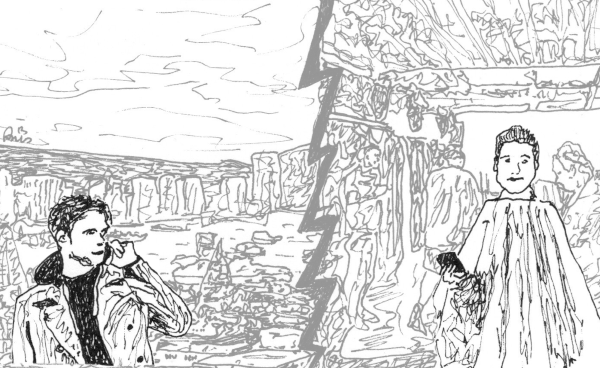 |
(Italiano) Il destino ha in serbo per i Ragazzi alcuni ostacoli inaspettati: Mentre Heinz affronta alcune avversità a bordo del cargo diretto in Giappone, Helmut scopre un misterioso uovo gigante che alla fine non gli permette di raggiungere il porto così velocemente come aveva previsto. |
(Deutsch) Das Schicksal hält einige ungeahnte Hindernisse für die Jungs bereit: Während Heinz sich an Bord des Frachters nach Japan einigen Widrigkeiten ausgesetzt sieht, entdeckt Helmut ein mysteriöses riesiges Ei, was letztlich dazu führt, dass er nicht ganz so schnell am Hafen ist, wie er ursprünglich geplant hatte. Normal Version | ||
Tag 37 1 Heinz: Ach, Helmut, du bist's. Na, wie geht's denn immer? |
Day 37 Heinz: Oh, Helmut, it's you. Well, how are things? |
Jour 37 Heinz : Ah, Helmut, c'est toi. Alors, ça va toujours ? |
Giorno 37 Heinz: Oh, Helmut, sei tu. Beh, come vanno le cose? |
Día 37 Heinz: Ah, Helmut, eres tú. ¿Cómo van las cosas? |
2 Heinz: Zum Glück hatte ich das Gimmick dabei. Das Handy ist unbeschädigt. |
Heinz: Luckily I had the gimmick with me. The cell phone is undamaged. |
Heinz : Heureusement que j'avais le gadget avec moi. Le portable est intact. |
Heinz: Meno male che avevo con me il gadget. Il cellulare è intatto. |
Heinz: Por suerte llevaba el artilugio conmigo. El móvil está intacto. |
3 Heinz: Der Lärm hat die anderen angelockt und die haben sich vor Lachen an der Wand abstützen müssen. |
Heinz: The noise attracted the others and they had to hold on to the wall because they were laughing so hard. |
Heinz : Le bruit a attiré les autres et ils ont dû s'appuyer contre le mur à force de rire. |
Heinz: Il rumore attirò gli altri e dovettero appoggiarsi al muro per le risate. |
Heinz: El ruido atrajo a los demás y tuvieron que apoyarse contra la pared, de tanto reírse. |
4 Helmut: Ach so, ja. Also ganz so aufregend war es bei mir nicht. Ich habe wie geplant den Tag mit Jack verbracht. Wir sind gegen zwei Uhr nachts erst wieder zurück gewesen. |
Helmut: Right. Well, it wasn't quite as exciting on my end. I spent the day with Jack as planned. We didn't get back until about two o'clock in the morning. |
Helmut : Ah oui, hein. Eh bien, ce n'était pas aussi excitant de mon côté. J'ai passé la journée avec Jack comme prévu. Nous ne sommes rentrés que vers deux heures du matin. |
Helmut: Oh sì. Beh, per quanto mi riguarda non è stato altrettanto emozionante. Ho trascorso la giornata con Jack come previsto. Siamo tornati solo verso le due del mattino. |
Helmut: Oh, sí. Bueno, para mí no fue tan emocionante. Pasé el día con Jack como estaba previsto. No volvimos hasta cerca de las dos de la mañana. |
5 Heinz: Du konntest also nicht schlafen, sagtest du. |
Heinz: So you couldn't sleep, you said. |
Heinz : Alors tu n'arrivais pas à dormir, tu as dit. |
Heinz: Hai detto che non riuscivi a dormire. |
Heinz: Dijiste que no podías dormir. |
6 Heinz: Ja gut, aber man muss ja irgendwie rauskommen können. |
Heinz: Yes, but there has to be a way to get out. |
Heinz : Oui, d'accord, mais il faut bien pouvoir sortir. |
Heinz: Sì, ma devi poter uscire in qualche modo. |
Heinz: Sí, pero tienes que poder salir de alguna manera. |
7 Helmut: Eben. Bedauerlicherweise ist Jacks Tochter auswärts bei Freunden gewesen und vorhin erst zurückgekommen, nach zwei Tagen. Jack dachte, ich sei auf dem Schiff. |
Helmut: Exactly. Unfortunately, Jack's daughter has been away with friends and only just got back, after two days. Jack thought I was on the ship. |
Helmut : Exactement. Malheureusement, la fille de Jack est partie chez des amis et n'est revenue que tout à l'heure, après deux jours. Jack pensait que j'étais sur le bateau. |
Helmut: Esattamente. Purtroppo la figlia di Jack è andata a stare da amici e non è tornata fino a poco fa, dopo due giorni. Jack pensava che fossi sulla nave. |
Helmut: Exacto. Por desgracia, la hija de Jack se fue a casa de unos amigos y no volvió hasta ahora, después de dos días. Jack pensaba que yo estaba en el barco. |
(English) Together again! Heinz and Helmut have a lot to talk about in Yokohama. While they do so, they devote themselves to an important task, for which Helmut has found the right means of transportation. |
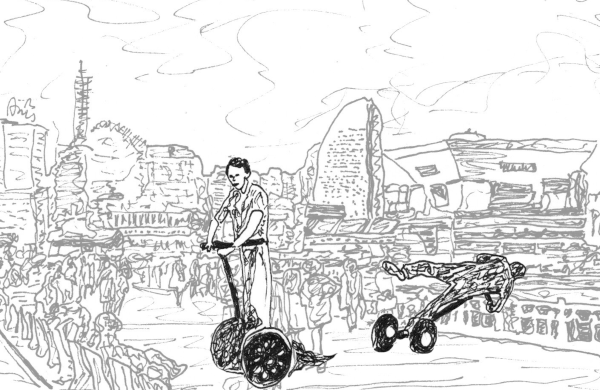 |
(Italiano) Di nuovo insieme! Heinz e Helmut hanno molto di cui parlare a Yokohama. Nel frattempo, si dedicano a un compito importante, per il quale Helmut ha trovato il giusto mezzo di trasporto. |
(Deutsch) Wieder vereint! In Yokohama haben sich Heinz und Helmut viel zu erzählen. Während sie das tun, widmen sie sich einer wichtigen Aufgabe, wofür Helmut das passende Fortbewegungsmittel gefunden hat. Normal Version | ||
Tag 40 1 Helmut: No no, Mister Wachtmeister! Mister Officer, here please, visa visa! |
Day 40 Helmut: No no, Mr. Officer! Mister Officer, here please, visa visa! |
Jour 40 Helmut : No no, Mister l'agent ! Mister Officer, here please, visa visa ! |
Giorno 40 Helmut: No no, Mister agente! Mister Officer, here please, visa visa! |
Día 40 Helmut: ¡No no, Mister agente! ¡Mister Officer, here please, visa visa! |
2 Helmut: Hier ist dein internationaler Führerschein. Setz den Helm auf, den Rest sag ich dir unterwegs. |
Helmut: Here's your international driving permit. Put the helmet on, I'll tell you the rest on the way. |
Helmut : Voici ton permis international. Mets ton casque, je te dirai le reste en route. |
Helmut: Ecco la tua patente di guida internazionale. Mettiti il casco, il resto te lo dico strada facendo. |
Helmut: Aquí tienes tu permiso internacional. Ponte el casco y te contaré el resto por el camino. |
3 Helmut: Nicht in die Blumen! Pass doch auf, Mann. |
Helmut: Not into the flowers! Watch out, man. |
Helmut : Pas dans les fleurs ! Fais attention, mec. |
Helmut: Non nei fiori! Attento, amico. |
Helmut: ¡En las flores no! Cuidado, tío. |
4 Heinz: Wo ist eigentlich der Park? Hier ist überall asphaltierte Uferpromenade. |
Heinz: Where is the park anyway? There's asphalt promenade everywhere. |
Heinz : Au fait, où est le parc ? Ici, il y a de l'asphalte partout sur la rive. |
Heinz: A proposito, dov'è il parco? Qui c'è l'asfalto lungo tutta la costa. |
Heinz: Por cierto, ¿dónde está el parque? Aquí hay asfalto a lo largo de toda la costa. |
5 Helmut: Aouuda!! Wo bist du Mistvieh? |
Helmut: Aouuda! Where are you bitch? |
Helmut : Aouuda ! Où es-tu, sale bête ? |
Helmut: Aouuda! Dove sei, bestiaccia? |
Helmut: ¡¡Aouuda!! ¿Dónde estás, canalla? |
6 Helmut: Donnerwetter! Und hattest du auch wieder Erleuchtungen? |
Helmut: Good Golly Miss Molly! And did you have any more epiphanies too? |
Helmut : La vache ! Et tu as encore eu des épiphanies ? |
Helmut: Accidenti! E hai avuto un'altra epifania? |
Helmut: ¡Caramba la bamba! ¿Y tuviste otra epifanía? |
7 Helmut: Nein, ist das tief! Das Ei. Scheiße, das ist tief! Wow, du bist ... |
Helmut: No way, this is deep! The egg. Man, that's deep shit! Wow, you're... |
Helmut : Non, c'est profond ! L'uf. Merde, c'est profond ! Wow, tu es... |
Helmut: No! È profondo! L'uovo. Merda, è profondo! Wow, sei... |
Helmut: ¡No, es profundo! El huevo. Mierda, ¡qué profundo! Vaya, eres... |
(English) The Boys embark to reach the USA and all is right with the world again. However, Heinz is not satisfied with the small shared cabin and thus looks for alternative accommodation on board. |
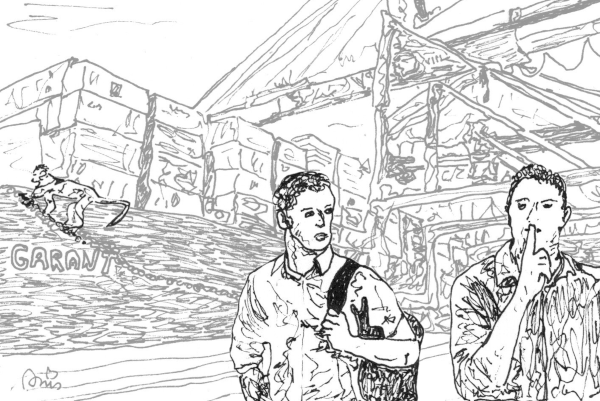 |
(Italiano) I Ragazzi si imbarcano per raggiungere gli Stati Uniti e tutto il mondo è ritornato a posto. Tuttavia, Heinz non è soddisfatto della piccola cabina condivisa e cerca una collocazione alternativa a bordo. |
(Deutsch) Die Jungs schiffen ein, um die USA zu erreichen, und ihre Welt ist wieder in Ordnung. Allerdings will sich Heinz nicht mit der kleinen Gemeinschaftskajüte zufriedengeben und sucht daher nach einer alternativen Behausungsmöglichkeit an Bord. Normal Version | ||
San Francisco! Tag 41 1 Helmut: Pong! Aargh. Wieso stellen die hier überall Schilder auf?! |
San Francisco! Day 41 Helmut: Pong! Aargh. Why are they putting up signs everywhere? |
San Francisco ! Jour 41 Helmut : Pong ! Aargh. Pourquoi mettent-ils des panneaux partout ici ?! |
San Francisco! Giorno 41 Helmut: Pong! Aargh. Perché mettono cartelli ovunque qui? |
Día 41 Helmut: ¡Pong! Aargh. ¿Por qué ponen señales por todas partes? |
2 Heinz: (...) Wonach suchst du? |
Heinz: (...) What are you looking for? | Heinz : (...) Qu'est-ce que tu cherches ? |
Heinz: (...) Cosa stai cercando? |
Heinz: (...) ¿Qué buscas? |
3 Heinz: Schokoladentäfelchen wären gut. |
Heinz: Chocolate bars would be good. |
Heinz : Des tablettes de chocolat seraient les bienvenues. |
Heinz: Le barrette di cioccolato non sarebbero male. |
Heinz: Unas barritas de chocolate estarían bien. |
4 Helmut: (...) Ah, da bist du ja wieder. Nimm dir'n Keks! |
Helmut: (...) Ah, there you are again. Have a cookie! |
Helmut : (...) Ah, te revoilà. Prends un biscuit ! |
Helmut: (...) Ah, eccoti di nuovo. Prendi un biscotto! |
Helmut: (...) Ah, ahí estás otra vez. ¡Toma una galleta! |
5 Heinz: Hier entlang. |
Heinz: This way. |
Heinz : Par ici. |
Heinz: Da questa parte. |
Heinz: Por aquí. |
6 Heinz: Tadaaa! |
Heinz: Tadaaa! |
Heinz : Tadaaa ! |
Heinz: Tadaaa! |
Heinz: ¡Tadaaa! |
(English) Who would have thought how much garbage can accumulate in two weeks! The hygiene in their new apartment leaves a lot to be desired, but the Boys don't care. They return to the roots of humankind and are not fazed by outward appearances. |
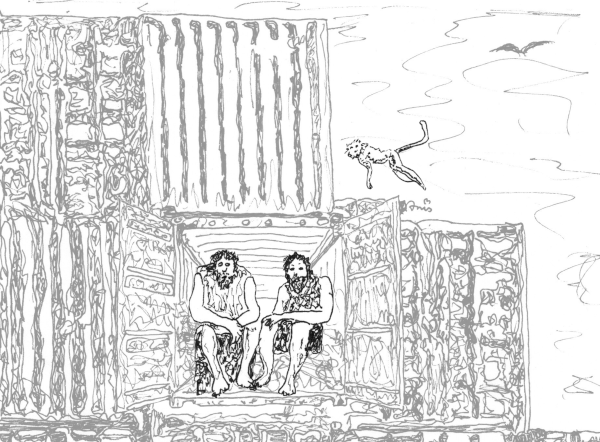 |
(Italiano) Chi avrebbe mai pensato a quanta spazzatura si può accumulare in quindici giorni! L'igiene del loro nuovo appartamento lascia molto a desiderare, ma ai Ragazzi non importa. Tornano alle radici dell'umanità e non si lasciano turbare dalle apparenze. |
(Deutsch) Wer hätte gedacht, wie viel Müll sich in zwei Wochen ansammeln kann! Die Hygiene in ihrer neuen Wohnung lässt zu wünschen übrig, doch die Jungs lässt das kalt. Sie kehren zurück zu den Wurzeln der Menschheit und lassen sich durch Äußerlichkeiten nicht irritieren. Normal Version | ||
Tag 54 1 Heinz: Org ga iaa |
Day 54 Heinz: Org ga yaa |
Jour 54 Heinz : Org ga iaa |
Giorno 54 Heinz: Org ga iaa |
Día 54 Heinz: Org ga iaa |
2 Heinz: Oh Mann. |
Heinz: Oh boy. |
Heinz : Oh là là ! |
Heinz: Oh, cielo. |
Heinz: Oh, vaya. |
3 Helmut: Wir waren in einem Land vor unserer Zeit. |
Helmut: We were in a country before our time. |
Helmut : Nous étions dans un pays avant notre temps. |
Helmut: Eravamo in un mondo prima del tempo. |
Helmut: Estábamos en un país antes de tiempo. |
4 Heinz: Da kommt einer, rutsch mal weiter in den Container. Ah, ist schon wieder weg. |
Heinz: Someone's coming, slide further into the container. Ah, he's gone again. |
Heinz : Quelqu'un arrive, glisse-toi un peu plus loin dans le conteneur. Ah, il est déjà parti. |
Heinz: Sta arrivando qualcuno, scivola un po' più in là nel contenitore. Ah, se n'è già andato. |
Heinz: Aquí viene uno, deslízate más dentro del contenedor. Ah, se ha vuelto a ir. |
5 Heinz: Wo der Höhlenclan bereits sehnsüchtig oben wartet und vor Hunger an Muschelschalen leckt. |
Heinz: Where the cave clan is already eagerly waiting up above, hungrily licking mussel shells. |
Heinz : Où le clan de la grotte attend déjà avec impatience en haut et lèche des coquilles de moules à cause de la faim. |
Heinz: Dove il clan delle caverne sta già aspettando con impazienza in alto, leccando gusci di cozze per la fame. |
Heinz: Donde el clan de las cavernas ya espera impaciente en lo alto, lamiendo conchas de mejillón por el hambre. |
(English) Not everything always goes according to plan. The Boys are stopped in the USA and don't know what to do next. They reflect on their mission and their skills. Perhaps a basketball game will help them get back on track. |
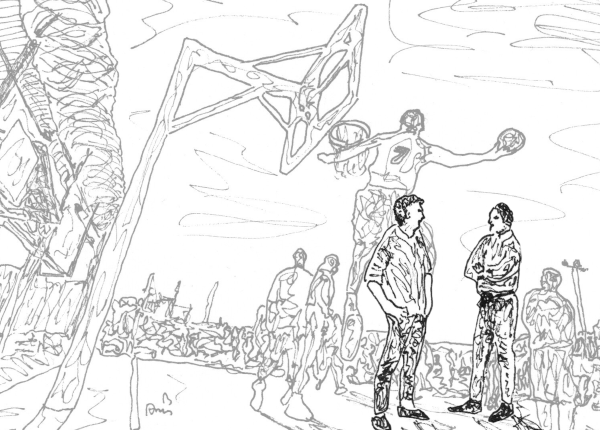 |
(Italiano) Non sempre tutto va secondo i piani. I Ragazzi vengono fermati negli Stati Uniti e non sanno cosa fare. Riflettono sulla loro missione e sulle loro capacità. Forse una partita di basket li aiuterà a rimettersi in carreggiata. |
(Deutsch) Nicht immer läuft alles nach Plan. Die Jungs werden in den USA aufgehalten und wissen nicht weiter. Sie besinnen sich auf ihre Mission und ihre Fähigkeiten. Vielleicht hilft ein Basketballspiel dabei, ihnen auf die Sprünge zu helfen. Normal Version | ||
Tag 56 1 Heinz: Und? |
Day 56 Heinz: So? |
Jour 56 Heinz : Alors ? |
Giorno 56 Heinz: E? |
Día 56 Heinz: ¿Y? |
2 Heinz: Was für ein Schock, als Fisk mit den Beamten an Bord gekommen ist. |
Heinz: What a shock when Fisk came on board with the officials. |
Heinz : Quel choc quand Fisk est monté à bord avec les fonctionnaires. |
Heinz: Che shock quando Fisk è salito a bordo con gli ufficiali. |
Heinz: Menudo susto cuando Fisk llegó con los funcionarios. |
3 Helmut: Ich frage mich, ob das Buch uns weiterhelfen kann. |
Helmut: I wonder if the book can help us. |
Helmut : Je me demande si le livre peut nous aider. |
Helmut: Mi chiedo se il libro possa aiutarci. |
Helmut: Me pregunto si el libro nos puede ayudar. |
4 Heinz: Des Rätsels Lösung steckt in unserem Reiseführer. |
Heinz: The answer to the problem is in our guidebook. |
Heinz : La réponse au problème se trouve dans notre guide. |
Heinz: La risposta al problema è nella nostra guida. |
Heinz: La respuesta al acertijo está en nuestra guía. |
5 Heinz: Der ungeplante Aufenthalt mitten in Indien ist eine Parallele. |
Heinz: The unplanned stay in the middle of India is a parallel. |
Heinz : Le séjour imprévu au milieu de l'Inde est un parallèle. |
Heinz: Il soggiorno non pianificato nel mezzo dell'India è un parallelo. |
Heinz: La estancia imprevista en medio de la India es un paralelismo. |
6 Heinz: Oh, da sind sie. Jetzt gibt's bestimmt Ärger. |
Heinz: Oh, there they are. We'll probably get in trouble. |
Heinz : Oh, les voilà. Il va y avoir des problèmes. |
Heinz: Oh, ecco che arrivano. Ci saranno problemi. |
Heinz: Ah, ahí están. Seguro que hay problemas. |
(English) The journey finally continues, but a lot of time has passed. Helmut no longer believes that they will win the bet, even if they manage to barely make their train. But then Heinz has an idea that gives him hope. |
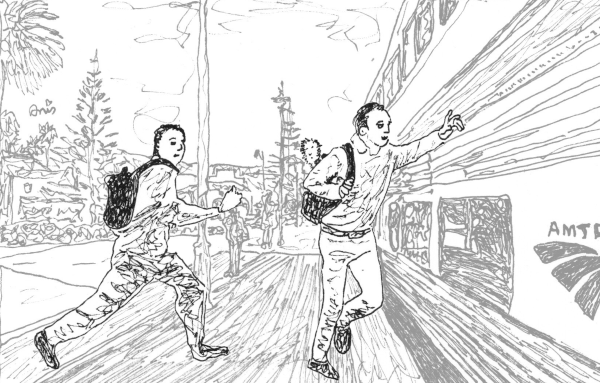 |
(Italiano) Il viaggio finalmente prosegue, ma è passato molto tempo. Helmut non crede più che vinceranno la scommessa, anche se riusciranno con fatica a raggiungere il treno. Ma Heinz ha un'idea che gli dà speranza. |
(Deutsch) Endlich geht es weiter, doch ist viel Zeit vergangen. Helmut glaubt nicht mehr daran, dass sie die Wette gewinnen, selbst wenn sie ihren Zug mit Mühe und Not erreichen können. Da hat Heinz eine Idee, die ihm Hoffnung gibt. Normal Version | ||
der Zug! Tag 71 1 Helmut: Es ist aus! Finito, Fahnenabend, Ende der Feierstange. |
the train! Day 71 Helmut: It's over! Finito, closing time, end of story line. |
le train ! Jour 71 Helmut : C'est fini ! Finito, fin de la fête, fin de tout. |
il treno! Giorno 71 Helmut: È finito! Finito, tempo di chiusura, fine dei giochi. |
el tren! Día 71 Helmut: ¡Se acabó! Finito, hora de la línea, fin de cierre. |
2 Heinz: In 15 Tagen kann man offenbar so einiges lernen. |
Heinz: Apparently one can learn a lot in 15 days. |
Heinz : Apparemment, on peut apprendre beaucoup de choses en 15 jours. |
Heinz: Ovviamente si può imparare molto in 15 giorni. |
Heinz: Por lo visto se puede aprender mucho en 15 días. |
3 Heinz: Oder Fisk hatte ein schlechtes Gewissen. |
Heinz: Or Fisk had a guilty conscience. |
Heinz : Ou bien Fisk avait mauvaise conscience. |
Heinz: Oppure Fisk aveva la coscienza sporca. |
Heinz: O Fisk tenía mala conciencia. |
4 Heinz: Vielleicht ein U-Boot. |
Heinz: Maybe a submarine. |
Heinz : Peut-être un sous-marin. |
Heinz: Forse un sottomarino. |
Heinz: Quizá un submarino. |
5 Helmut: Der fährt schon los! Schneller, schneller! |
Helmut: It's leaving already! Faster, faster! |
Helmut : Il démarre déjà ! Plus vite, plus vite ! |
Helmut: Sta già partendo! Più veloce, più veloce! |
Helmut: ¡Ya se va! ¡Más rápido, más rápido! |
6 Helmut: Ja, das werde ich sofort tun. Was rechnest du denn da? |
Helmut: Yes, I'll do that straight away. What are you calculating? |
Helmut : Oui, je vais le faire tout de suite. Qu'est-ce que tu calcules ? |
Helmut: Sì, lo farò subito. Cosa stai calcolando? |
Helmut: Sí, lo haré ahora mismo. ¿Qué estás calculando? |
(English) As Heinz and Helmut stretch their legs on the train, they observe a suspicious man near their cabin and want to get to the bottom of the matter. They also receive some very good news as well as some that unsettles them. |
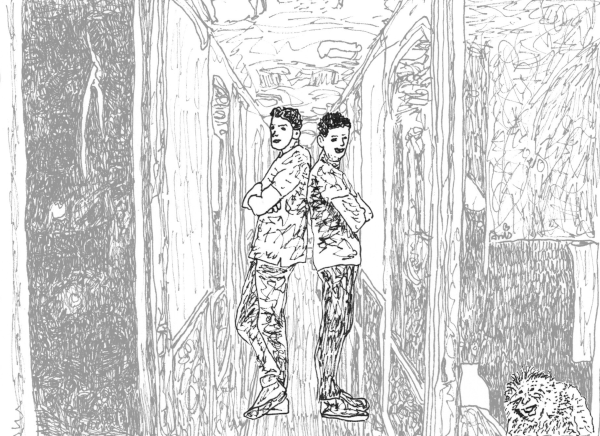 |
(Italiano) Mentre Heinz e Helmut si sgranchiscono le gambe sul treno, osservano un uomo sospetto vicino al loro scompartimento e vogliono andare a fondo della questione. Oltre a una notizia molto buona, ricevono anche una notizia inquietante. |
(Deutsch) Als Heinz und Helmut sich im Zug ein wenig die Beine vertreten, beobachten sie einen verdächtigen Mann in der Nähe ihres Abteils und wollen der Sache auf den Grund gehen. Außerdem erhalten sie neben sehr guten Nachrichten auch solche, die sie verstören. Normal Version | ||
Tag 73 1 Heinz: Wach auf, Mann, dein Telefon klingelt! |
Day 73 Heinz: Wake up, man, your phone's ringing! |
Jour 73 Heinz : Réveille-toi, mec, ton téléphone sonne ! |
Giorno 73 Heinz: Svegliati, amico, il tuo telefono sta squillando! |
Día 73 Heinz: ¡Despierta, tío, te suena el móvil! |
2 Helmut: Wir kriegen das U-Boot. |
Helmut: We'll get the submarine. |
Helmut : Nous aurons le sous-marin. |
Helmut: Avremo il sottomarino. |
Helmut: Tendremos el submarino. |
3 Heinz: Woher kennst du den Namen der Schaffnerin? |
Heinz: How do you know the conductor's name? |
Heinz : Comment connais-tu le nom de la conductrice ? |
Heinz: Come fai a sapere il nome del controllore? |
Heinz: ¿Cómo sabes el nombre del revisor? |
4 Heinz: Da dreht man sich einmal kurz um und schon passiert so etwas. |
Heinz: One quick turn around and something like this happens. |
Heinz : On se retourne un instant et voilà ce qui arrive. |
Heinz: Ti giri una volta e succede una cosa del genere. |
Heinz: Nos damos la vuelta un momento y eso es lo que pasa. |
5 Helmut: Vielleicht hoffen sie so auf ein Geständnis. |
Helmut: Maybe they're hoping for a confession. |
Helmut : Peut-être qu'ils espèrent ainsi obtenir des aveux. |
Helmut: Forse sperano in una confessione. |
Helmut: Quizá esperan una confesión. |
6 Heinz: Sag mal, sagen dir die Namen Chuck Shoeman, Gershwin Duckstein und Stan Hartley etwas? |
Heinz: Tell me, do the names Chuck Shoeman, Gershwin Duckstein and Stan Hartley ring a bell? |
Heinz : Dis-moi, les noms de Chuck Shoeman, Gershwin Duckstein et Stan Hartley te disent-ils quelque chose ? |
Heinz: Dimmi, i nomi Chuck Shoeman, Gershwin Duckstein e Stan Hartley ti dicono qualcosa? |
Heinz: Dime, ¿significan algo para ti los nombres de Chuck Shoeman, Gershwin Duckstein y Stan Hartley? |
(English) In Chicago, Helmut buys some new clothes and the travelers spend a few hours in the park when a wind comes up. With the help of one of Helmut's gimmicks, the Boys learn more about their mysterious release. |
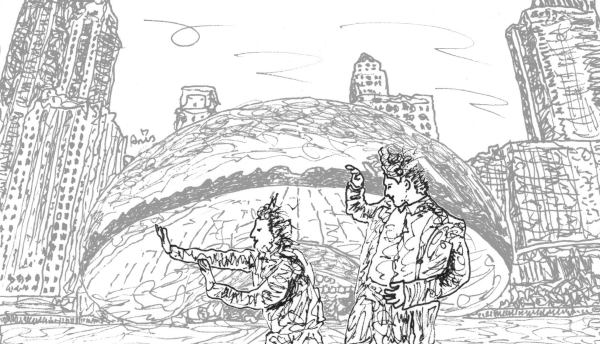 |
(Italiano) A Chicago, Helmut compra dei vestiti nuovi e i viaggiatori trascorrono qualche ora nel parco quando si alza un vento. Con l'aiuto di uno dei gadget di Helmut, i Ragazzi scoprono qualcosa in più sul loro misterioso rilascio. |
(Deutsch) In Chicago kauft sich Helmut neue Kleidung und die Reisenden verbringen einige Stunden im Park, als ein Wind aufkommt. Mithilfe eines von Helmuts Gimmicks erfahren die Jungs mehr über ihre geheimnisvolle Freilassung. Normal Version | ||
Tag 74 1 Heinz: Du musst doch irgendwas davon mitbekommen haben. |
Day 74 Heinz: But you must have noticed something or other. |
Jour 74 Heinz : Mais tu as dû remarquer une chose ou une autre. |
Giorno 74 Heinz: Ma devi aver notato qualcosa o altra cosa. |
Día 74 Heinz: Pero te habrás dado cuenta de alguna cosa. |
2 Heinz: Immerhin ist das Wetter einigermaßen und es gibt diesen Park hier. |
Heinz: At least the weather's reasonable and there's this park here. |
Heinz : Au moins, le temps est raisonnable et il y a ce parc ici. |
Heinz: Almeno il tempo è ragionevole e c'è un parco qui. |
Heinz: Al menos el tiempo es razonable y aquí hay un parque. |
3 Helmut: Ich habe dieses Papier hier ins Gesicht gekriegt. Was ist das? |
Helmut: I got this paper in my face. What's that? |
Helmut : Je me suis pris ce papier dans la figure. Qu'est-ce que c'est ? |
Helmut: Ho questo foglio in faccia. Che cos'è? |
Helmut: Tengo este papel en la cara. ¿Qué es? |
4 Helmut: Wir schleppen ihn hier ins Gebüsch, ist sowieso kaum noch jemand hier. Schleif schleif |
Helmut: We'll drag him into the bushes, there's hardly anyone left around anyway. Lug lug drag |
Helmut : Nous allons le traîner dans les buissons, il n'y a presque plus personne dans le coin de toute façon. Trimb tire |
Helmut: Lo trascineremo tra i cespugli, tanto qui non c'è quasi più nessuno. Trasc trasc |
Helmut: Le arrastraremos hasta los arbustos, de todas formas ya casi no queda nadie. Arrastr-arrastr-arrastr |
5 Heinz: Elwood wusste es nicht und ich weiß es auch nicht. Hey, kuck mal da! |
Heinz: Elwood didn't know and I don't know either. Hey, look at that! |
Heinz : Elwood ne le savait pas et moi non plus. Hé, regarde ça ! |
Heinz: Elwood non lo sapeva e nemmeno io. Ehi, guarda un po'! |
Heinz: Elwood no lo sabía y yo tampoco lo sé. Eh, ¡mira eso! |
(English) The Boys spend the last part of their journey under water. They can still win the bet, which makes them optimistic, even if Helmut would have liked a panoramic window like in the Nautilus and Heinz would be happy if he could free himself from his trap. |
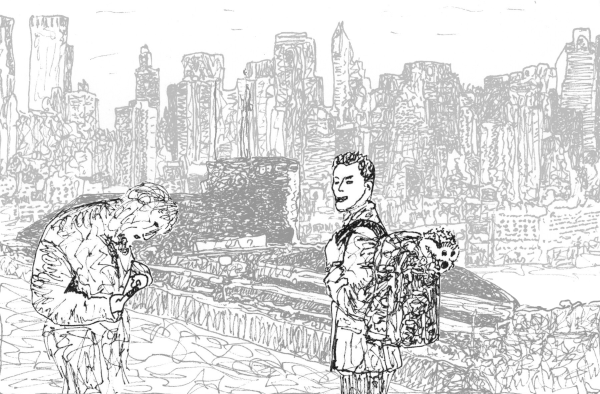 |
(Italiano) I Ragazzi trascorrono l'ultima tappa del loro viaggio sott'acqua. Possono ancora vincere la scommessa e questo li rende ottimisti, anche se Helmut avrebbe voluto una finestra panoramica come nel Nautilus e Heinz sarebbe felice di potersi liberare dalla sua trappola. |
(Deutsch) Die letzte Etappe ihrer Reise verbringen die Jungs unter Wasser. Noch immer können sie die Wette gewinnen, das stimmt sie optimistisch, auch wenn Helmut sich ein Panoramafenster wie in der Nautilus gewünscht hätte und Heinz froh wäre, wenn er sich aus seiner Falle befreien könnte. Normal Version | ||
Tag 75 1 Heinz: Nun hast du den Taxifahrer ganz verwirrt. |
Day 75 Heinz: Now you've completely confused the cab driver. |
Jour 75 Heinz : Maintenant, tu as complètement embrouillé le chauffeur de taxi. |
Giorno 75 Heinz: Ora hai confuso completamente il tassista. |
Día 75 Heinz: Ahora has confundido por completo al taxista. |
2 Helmut: Du steckst den rechten Zeigefinger in das eine Loch ... |
Helmut: You stick your right index finger into the one hole... |
Helmut : Tu mets ton index droit dans l'un des trous... |
Helmut: Metti il dito indice destro nell'unico foro... |
Helmut: Metes el dedo índice derecho en uno de los agujeros... |
3 Heinz: Ich kann nicht so schnell. |
Heinz: I can't walk that fast. |
Heinz : Je ne peux pas marcher aussi vite. |
Heinz: Non posso camminare così velocemente. |
Heinz: No puedo andar tan rápido. |
4 Helmut: Nenn sie doch einfach Tick, Trick und Track. |
Helmut: Why don't you just call them Huey, Dewey and Louie? |
Helmut : Pourquoi ne pas les appeler Riri, Fifi et Loulou ? |
Helmut: Perché non li chiami semplicemente Qui, Quo e Qua? |
Helmut: ¿Por qué no les llamas Hugo, Paco y Luis? |
5 Heinz: Mist, jetzt ist mein Glas weggerutscht. |
Heinz: Shoot, now my glass has slipped. |
Heinz : Zut, mon verre a glissé. |
Heinz: Cazzo, ora mi è scivolato il bicchiere. |
Heinz: Joder, ahora se me ha resbalado el vaso. |
6 Heinz: Hat Jack dir denn einen Job in Aussicht gestellt? Mann, lass dir nicht alles aus der Nase ziehen! |
Heinz: Has Jack promised you a job? Man, don't let me pull everything out of your nose! |
Heinz : Est-ce que Jack t'a promis un travail ? Mec, ne me laisse pas te tirer les vers du nez ! |
Heinz: E Jack ti ha promesso un lavoro? Amico, non farmi tirare fuori tutto dal tuo naso! |
Heinz: ¿Y Jack te prometió un trabajo? Tío, ¡no me hagas sacártelo todo de las narices! |
(English) Unexpected difficulties cause the punctual arrival in London to suddenly be in doubt. Helmut tries to approach the matter rationally, but the people around him create a great deal of chaos and even the captain is unable to find constructive solutions. |
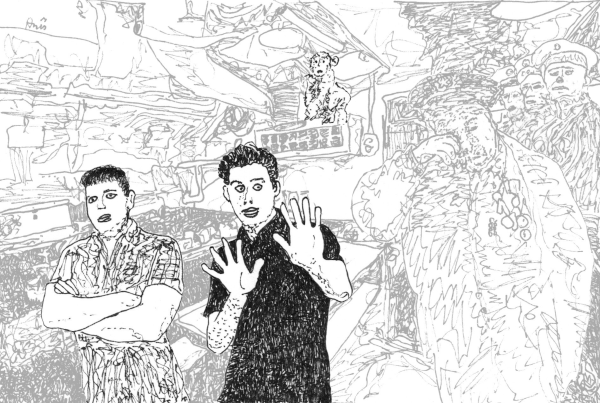 |
(Italiano) A causa di difficoltà inaspettate, l'arrivo puntuale a Londra viene improvvisamente messo in dubbio. Helmut cerca di adottare un approccio razionale, ma le persone che lo circondano creano un gran caos e persino il capitano non riesce a trovare soluzioni costruttive. |
(Deutsch) Unerwartete Schwierigkeiten führen dazu, dass die pünktliche Ankunft in London plötzlich in Frage steht. Helmut versucht, rational an die Sache heranzugehen, doch produzieren die Menschen um ihn herum ein großes Chaos und selbst der Kapitän ist zu konstruktiven Lösungen nicht zu gebrauchen. Normal Version | ||
Der Beschämte Tag 78 1 Helmut: Was?? Ihr habt Aouda aufgegessen? |
The Shamed Day 78 Helmut: What?? You've eaten Aouda? |
L'Embarrassé Jour 78 Helmut : Quoi ?? Vous avez mangé Aouda ? |
Giorno 78 Helmut: Cosa? Avete mangiato Aouda?? |
Día 78 Helmut: ¿¿Qué?? ¿Habéis comido Aouda? |
2 Heinz: Da steht, dass wir es bis morgen nicht schaffen. Wir kommen erst übermorgen an. |
Heinz: It says we won't make it tomorrow. We won't arrive until the day after tomorrow. |
Heinz : Ça dit que nous ne serons pas là demain. Nous n'arriverons qu'après-demain. |
Heinz: Dice che non ce la faremo domani. Non arriveremo prima di dopodomani. |
Heinz: Dice que no conseguiremos llegar hasta mañana. No llegaremos hasta pasado mañana. |
3 Helmut: OK OK OK, jetzt nicht die Nerven aus den Augen verlieren. Was hat Nemo sonst noch gesagt? |
Helmut: OK OK OK, let's not lose sight of our nerves now. What else did Nemo say? |
Helmut : OK OK OK, ne perdons pas de vue notre sang-froid maintenant. Qu'est-ce que Nemo a dit d'autre ? |
Helmut: OK OK OK, non perdiamo di vista i nostri nervi ora. Cos'altro ha detto Nemo? |
Helmut: OK OK OK, no perdamos los nervios de vista ahora. ¿Qué más ha dicho Nemo? |
4 Heinz: Es wäre einfach ein würdiger Abschluss, meine ich. |
Heinz: It would just be a dignified end, I mean. |
Heinz : Ce serait simplement une fin digne, je veux dire. |
Heinz: Sarebbe una fine dignitosa, credo. |
Heinz: Sería un final digno, quiero decir. |
5 Heinz: Ja Mann, ist ja gut, Mann. Jetzt hat Track Streit mit Aouda angefangen. |
Heinz: Yeah man, all right, man. Now Louie has started a fight with Aouda. |
Heinz : Oui, mec, c'est bon, mec. Maintenant, Loulou a commencé à se disputer avec Aouda. |
Heinz: Sì, amico, va bene, amico. Ora Qua ha iniziato a litigare con Aouda. |
Heinz: Sí, tío, muy bien, tío. Ahora Luis ha empezado una pelea con Aouda. |
(English) A speedboat is already waiting for the Boys in the Thames, but they are running out of time. At least that's what Helmut says. Heinz wants to convince him that there is another way of looking at it, but his friend is not to be dissuaded. Will they reach the Reform Club on time in the end? |
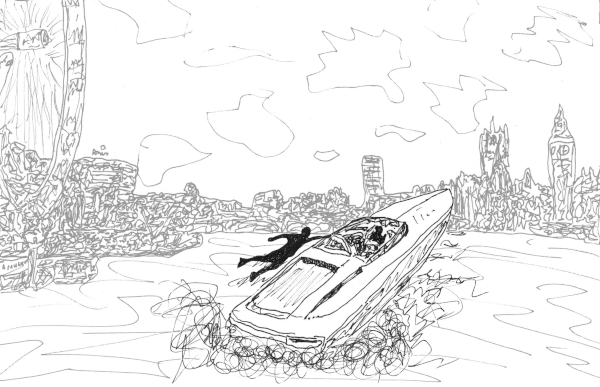 |
(Italiano) Un motoscafo sta già aspettando i Ragazzi nel Tamigi, ma non hanno più tempo. Almeno così dice Helmut. Heinz cerca di fargli capire che c'è un altro modo di vedere la cosa, ma il suo amico non si lascia dissuadere. Riusciranno a raggiungere il Reform Club in tempo? |
(Deutsch) In der Themse wartet schon ein Schnellboot auf die Jungs, doch die Zeit läuft den beiden davon. Das sagt jedenfalls Helmut. Heinz will ihm klarmachen, dass man das auch anders sehen kann, doch lässt sich sein Freund nicht beirren. Werden sie den Reformclub am Ende pünktlich erreichen? Normal Version | ||
ist relativ Tag 80 1 Heinz: Lass mich auch noch mal durch das Periskop kucken! |
is Relative Day 80 Heinz: Let me have another look through the periscope! |
est relatif Jour 80 Heinz : Laisse-moi aussi regarder à travers le périscope encore une fois ! |
è relativo Giorno 80 Heinz: Fammi dare un'altra occhiata attraverso il periscopio! |
Día 80 Heinz: ¡Déjame echar otro vistazo por el periscopio! |
2 Heinz: Es ist 10:48 Uhr, wir haben genau eine Stunde Zeit. Wobei ... |
Heinz: It's 10:48, we've got exactly one hour. Although... |
Heinz : Il est 10h48, il nous reste exactement une heure. Bien que... |
Heinz: Sono le 10:48, ci resta esattamente un'ora. Anche se... |
Heinz: Son las 10:48, nos queda exactamente una hora. Aunque... |
3 Helmut: Jippie!! Wir jagen übers Wasser! |
Helmut: Yippee! We're racing across the water! |
Helmut : Youhou ! On file sur l'eau ! |
Helmut: Evviva! Stiamo sfrecciando sull'acqua! |
Helmut: ¡Yupi! ¡Estamos volando sobre el agua! |
4 Heinz: Es ist ganz schön kalt geworden. Können wir das Verdeck schließen? |
Heinz: It's getting pretty cold. Can we close the top? |
Heinz : Il fait vraiment froid. On peut fermer la capote ? |
Heinz: Fa molto freddo. Possiamo chiudere la capote? |
Heinz: Hace mucho frío. ¿Podemos cerrar el tejado? |
5 Helmut: Noch 24 Minuten und es ist kein Riesenrad zu sehen. |
Helmut: Another 24 minutes and there's no Ferris wheel in sight. |
Helmut : Encore 24 minutes et il n'y a pas de grande roue en vue. |
Helmut: Altri 24 minuti e non si vede nessuna ruota panoramica. |
Helmut: Otros 24 minutos y no hay noria a la vista. |
6 Heinz: Wir haben das Boot geschrottet und einen Verkehrsstau ausgelöst. Zum Glück ist niemand verletzt. |
Heinz: We wrecked the boat and caused a traffic jam. Luckily no one is hurt. |
Heinz : Nous avons démoli le bateau et provoqué un embouteillage. Heureusement, personne n'est blessé. |
Heinz: Abbiamo distrutto la barca e causato un ingorgo. Per fortuna nessuno si è fatto male. |
Heinz: Hemos destrozado el barco y provocado un atasco. Por suerte no hay heridos. |
(English) The Boys arrive home more or less safe and sound and settle their affairs. They share the gains of their bet fraternally and it is not the only gain Heinz and Helmut have made at the end of their journey, it seems. |
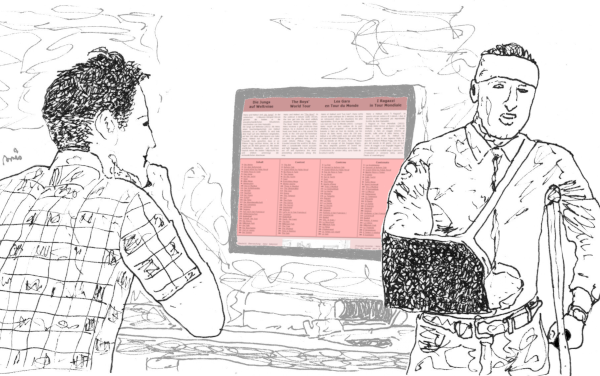 |
(Italiano) I Ragazzi arrivano a casa quasi sani e salvi e sistemano i loro affari. Condividono il guadagno della scommessa come fratelli e non è l'unico guadagno che Heinz e Helmut sembrano aver ottenuto alla fine del loro viaggio. |
(Deutsch) Die Jungs kommen weitgehend wohlbehalten zu Hause an und regeln ihre Angelegenheiten. Den Gewinn der Wette teilen sie sich brüderlich und es ist nicht der einzige Gewinn, den Heinz und Helmut am Ende ihrer Reise erlangt haben, wie es scheint. Normal Version | ||
Tag 82 1 Heinz: Ah Helmut, komm rein! Kuck mal, ich hab unser Reisetagebuch ins Netz gestellt! |
Day 82 Heinz: Ah Helmut, come in! Look, I've put our travel diary online! |
Jour 82 Heinz : Ah Helmut, entre donc ! Regarde, j'ai mis notre journal de voyage en ligne ! |
Giorno 82 Heinz: Ah Helmut, entra pure! Guarda, ho messo online il nostro diario di viaggio! |
Día 82 Heinz: ¡Ah Helmut, pasa! Mira, ¡he puesto nuestro diario de viaje en Internet! |
2 Helmut: Es tut immer noch ganz schön weh. |
Helmut: It still hurts quite a lot. |
Helmut : Ça fait toujours bien mal. |
Helmut: Mi fa ancora abbastanza male. |
Helmut: Todavía me duele bastante. |
3 Helmut: Erinner mich nicht daran! Es ist jedenfalls nichts gebrochen und wir mussten nicht durch den Zoll. Hatschi! |
Helmut: Don't remind me! Anyway, no bone is broken and we didn't have to go through customs. Achoo! |
Helmut : Ne m'en rappelle pas! En tout cas, aucun os n'est cassé et nous n'avons pas eu à passer la douane. Atchoum ! |
Helmut: Non ricordarmelo! Comunque, non ci siamo rotti nessun osso e non abbiamo dovuto passare la dogana. Etcì! |
Helmut: ¡No me lo recuerdes! De todos modos, no nos hemos roto ningún hueso y no hemos tenido que pasar por la aduana. ¡Achís! |
4 Heinz: Die Hälfte der Belegschaft will jetzt lieber ihn einstellen als mich zurückzunehmen. |
Heinz: Now half the staff would rather hire him than take me back. |
Heinz : La moitié du personnel maintenant préfère l'embaucher plutôt que de me reprendre. |
Heinz: Ora metà dello staff preferirebbe assumerlo piuttosto che riprendermi. |
Heinz: Ahora la mitad del personal preferiría contratarle a él antes que volver a aceptarme a mí. |
5 Heinz: Wie dem auch sei. Du, ich hab mir was ausgedacht. Und zwar spendiere ich dir von meinem Anteil des Wettgewinns eine Fahrt im Heißluftballon. Was sagst du? |
Heinz: Whatever. Hey, I've thought of something. I'll get us a ride in a hot air balloon from my share of the betting winnings. What do you say? |
Heinz : Quoi qu'il en soit. Écoute, j'ai pensé à quelque chose. Je t'offre un tour en montgolfière avec ma part des gains du pari. Qu'est-ce que tu en dis ? |
Heinz: Come vuoi. Senti, ho pensato a qualcosa. Ti regalerò un giro in mongolfiera con la mia parte di guadagno delle scommesse. Che ne dici? |
Heinz: Como quieras. Escucha, se me ha ocurrido algo. Te regalaré un paseo en globo aerostático con mi parte de las ganancias de la apuesta. ¿Qué te parece? |
6 Heinz: Was soll's! Es war eine tolle Reise. |
Heinz: Never mind! It was a great trip. |
Heinz : Tant pis ! C'était un voyage génial. |
Heinz: E allora, che differenza fa? È stato un viaggio fantastico. |
Heinz: ¡Qué demonios! Ha sido un gran viaje. |
7 Helmut: Nein. Es geht um dich. |
Helmut: No. It's about you. |
Helmut : Non, il s'agit de toi. |
Helmut: No. Si tratta di te. |
Helmut: No. Se trata de ti. |
| Nach der Weltreise geht es weiter mit Die Jungs in Moskau / After the World Tour, the story continues with The Boys in Moscow |
| up |  |
| Datenschutzerklärung und Impressum (data privacy statement and imprint) |